U.S. Policy and the Holocaust Refugee Crisis
Weighing the Evidence
All documents and text associated with this activity are printed below, followed by a worksheet for student responses.Introduction
Should the United States be a refuge for people fleeing their homes in times of war?
This question took a prominent place in the national conversation during the period between the two World Wars. Immigration restrictions had been in place since the 1920s which severely limited immigrants, especially from Southern and Eastern Europe. As the Nazis rose to power in Germany and threatened nearby countries, many Europeans – primarily Jewish Europeans – began seeking to leave and emigrate to America.
This question took a prominent place in the national conversation during the period between the two World Wars. Immigration restrictions had been in place since the 1920s which severely limited immigrants, especially from Southern and Eastern Europe. As the Nazis rose to power in Germany and threatened nearby countries, many Europeans – primarily Jewish Europeans – began seeking to leave and emigrate to America.
Some people argued that as a world superpower, we had a responsibility to open the door to refugees. Others argued that with the United States emerging from the Great Depression, we needed to focus on our own problems and not get involved in a conflict thousands of miles away.
Look at each artifact below and read its descriptions (click on the orange "open in new window" icon). Place it on the scale according to which conclusion (at the ends of the scale) it supports. Note that items you place at the ends of the scale are "heavier," or stronger evidence.
Name:
Class:
Class:
Worksheet
U.S. Policy and the Holocaust Refugee Crisis
Weighing the Evidence
Examine the documents and text included in this activity. Consider how each document does or does not support two opposing interpretations or conclusions. Fill in the topic or interpretations if they are not provided. To show how the documents support the different interpretations, enter the corresponding document number into the boxes near the interpretation. Write your conclusion response in the space provided. Interpretation 1
Given knowledge of the Nazi plan to exterminate Europe's Jews, the United States should have opened its doors wider to refugees.
Given knowledge of the Nazi plan to exterminate Europe's Jews, the United States should have opened its doors wider to refugees.
U.S. Policy and the Refugee Crisis
Interpretation 2
In the post-Depression period, the United States needed to focus on the war effort and economic issues more than international problems.
In the post-Depression period, the United States needed to focus on the war effort and economic issues more than international problems.
1
Activity Element
Memo from Assistant Secretary of State to State Department Officials on Temporarily Halting Immigration into the United States
Page 1

2
Activity Element
Correspondence from Howard Elting to Secretary of State Cordell Hull with Enclosure concerning German extermination of Jews
Page 1

3
Activity Element
Universal Newsreel Volume 17, Release 319
Page 1
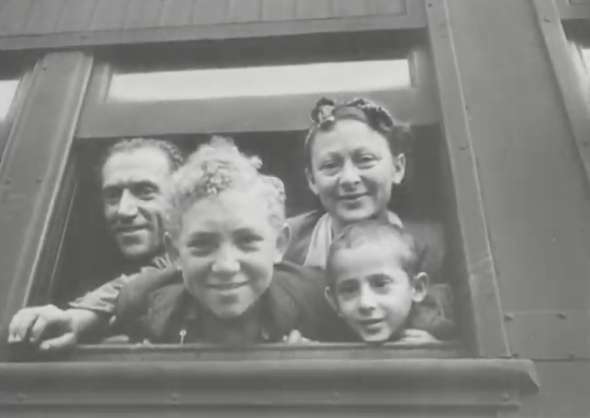
4
Activity Element
Report to the Secretary on the Acquiescence of this Government in the Murder of the Jews
Page 1
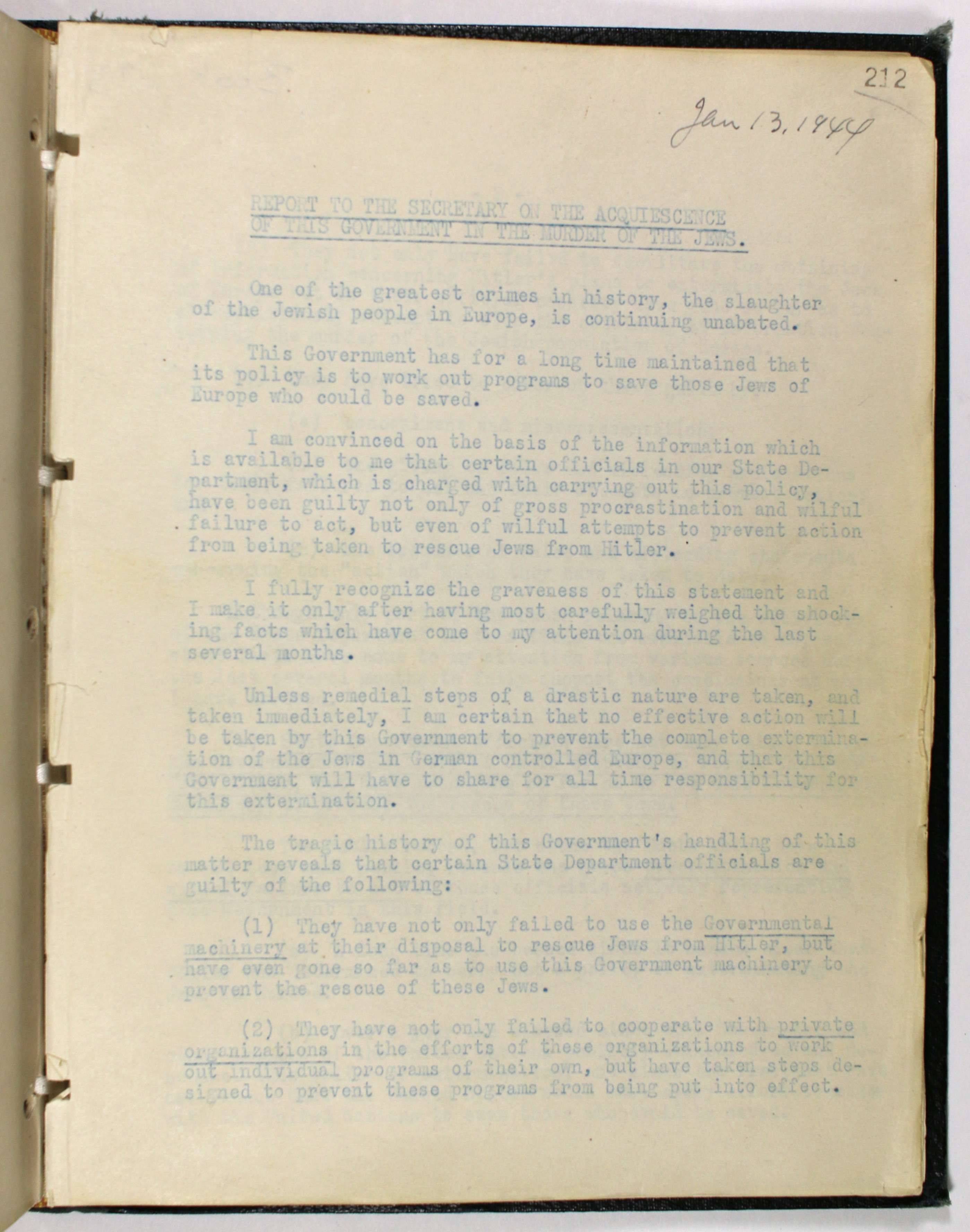
5
Activity Element
Draft Statement by the President of the United States Regarding War Crimes
Page 1

6
Activity Element
Refugees line up outside the American consulate in Marseille, France. (The United States Holocaust Memorial Museum)

7
Activity Element
Unemployed men queued outside a depression soup kitchen opened in Chicago by Al Capone
Page 1

8
Activity Element
Selected Emigration Trends, Jewish Emigration from Europe, 1926-1942, as Percentage of Total Jewish Emigrants
Page 1

9
Activity Element
Selected Emigration Trends, Jewish Emigration from Europe, 1885-1925, as Percentage of Total Jewish Emigrants
Page 1

10
Activity Element
Telegram from W. G. Blalcok to Senator Henry F. Ashurst Regarding Mexican Immigration
Page 1

Conclusion
U.S. Policy and the Holocaust Refugee Crisis
Weighing the Evidence
Answer these questions:
Now think about the following in preparation for a class discussion:
Immigration to the United States has been a subject of debate since the nation’s founding. Whether in wartime or in times of peace, the national value “Give me your tired, your poor” may conflict with the economic and political realities of the day. What do you think should be the primary concern governing American immigration policy? Explain why.
- On which side of the scale did most of your evidence fall?
- Why did you tip the scale the way you did?
- What lessons have been learned?
Now think about the following in preparation for a class discussion:
Immigration to the United States has been a subject of debate since the nation’s founding. Whether in wartime or in times of peace, the national value “Give me your tired, your poor” may conflict with the economic and political realities of the day. What do you think should be the primary concern governing American immigration policy? Explain why.
Your Response
Document
Memo from Assistant Secretary of State to State Department Officials on Temporarily Halting Immigration into the United States
6/26/1940
Assistant Secretary of State Breckinridge Long sent this memo to Assistant Secretary of State Adolf Berle and Director of the Office of European Affairs James Clement Dunn. It shows Long's anti-immigration policy during the Holocaust.
Long provides possible responses to an enclosed a memo from Avra M. Warren, chief of the State Department Visa Division, in which Warren states that "there is no authority of law to suspend the immigration quota for Germany."
Long suggests prohibiting the issuance of visas other than with State Department approval (transfering visa decisions from the U.S. consuls in Europe to the State Department), and temporarily stopping immigration by putting administrative obstacles in the way.
Long provides possible responses to an enclosed a memo from Avra M. Warren, chief of the State Department Visa Division, in which Warren states that "there is no authority of law to suspend the immigration quota for Germany."
Long suggests prohibiting the issuance of visas other than with State Department approval (transfering visa decisions from the U.S. consuls in Europe to the State Department), and temporarily stopping immigration by putting administrative obstacles in the way.
Transcript
[top left corner, red stamp]Assistant Secretary of State
Jun 27 1940
Mr. Long
[top right corner, red stamp]
Advisor on Political Relations
Mr. Dunn
Jun 27 1940
Department of State
[letterhead]
Department of State
Assistant Secretary
A-L
June 26, 1940.
A-B - Mr. Berle [red checkmark, in red: I agree. AB]
PA/D - Mr. Dunn [in blue: I think the 2 steps mentioned in the summary would be taken. JD]
Attached is a memorandum from Mr. Warren. I discussed the matter with him on the basis of this memorandum. There are two possibilities and I will discuss each category briefly.
Non-immigrants
Their entry into the United States can be made to depend upon prior authorization by the Department. This would mean that the consuls would be divested of discretion and that all requests for nonimmigrant visas (temporary visitor and transit visas) be passed upon here. It is quite feasible and can be done instantly. It will permit the Department to effectively control the immigration of persons in this category and private instructions can be given the Visa Division as to nationalities which should not be admitted as well as to individuals who are to be excluded.
This must be done for universal application and could not be done as regards Germany, for instance, or Russia, for instance, or any other one government because it would first, invite retaliation and second, would
probably be a violation of some of our treaty arrangements. The retaliation clause is [^material] in connection with Germany because it could mean the closing of our offices in almost all of Europe.
Immigrants
We can delay and effectively stop for a temporary period of indefinite length the number of immigrants [^coming] into the United States. We could do this by simply advising our consuls, to put every obstacle in the way and to require additional evidence and to resort to various administrative devices which would postpone and postpone and postpone the granting of the visas. However, this could only be temporary. In order to make it more definite It would have to be done by suspension of the rules under the law by the issuance of a proclamation of emergency--which I take it we are not yet ready to proclaim.
Summing Up
We can effectively control non-immigrants by prohibiting the issuance of visas unless the consent of the Department to obtained in advance for universal application.
We can temporarily prevent the number of immigrants from certain localities such as Cuba, Mexico and other places of origin of German intending immigrants by simply raising administrative obstacles. The
The Department will be prepared to take these two steps immediately upon the decision but emphasis must be placed on the fact that discrimination must not be practiced and with the additional thought that in case a suspension of the regulations should be proclaimed under the need of an emergency, it would be universally applicable and would affect refugees from England.
The Canadian situation and travel across that border we can handle through an exception to the general rule and so advise our consuls in Canada.
Department of State
Visa Division
Memorandum
[top right corner, red stamp]
Adviser on Political Relations
Mr. Dunn
Jun 27 1940
Department of State
[stamp]
Visa Division
Jul 5 1940
Department of State
[stamp]
Assistant Secretary of State
Jun 26 1940
Mr. Long
June 26, 1940
To: A-L - Mr. Long
PA/D - Mr. Dunn
From: VD - Mr. Warren
Under existing instructions, no diplomatic visa or passport visa may be granted to members of the armed forces of a country engaged in the European War without prior authorization from the Department. In the case of civilian officials of a country engaged in the European War, a request, either written or oral, must be received from the Foreign Office of the government concerned or, in the absence of such a request, the Department's authorization must be obtained before a diplomatic visa or a passport visa as a foreign government official may be issued. In addition, the visa applications of all journalists, including newspaper representatives, freelance reporters, and writers must be referred to the Department for consideration. Persons coming to the United States temporarily must show a reasonable need or a
a legitimate purpose. In the case of immigrants, the grounds for refusing a visa are defined in the Immigration Act of 1924 and in that of February 5, 1917.
There is no authority of law to suspend the immigration quota for Germany or any other country. Such a suspension would require specific legislation and the desirability of denying the entry into the United States of German nationals, either as immigrants or as nonimmigrants, must be considered in light of possible retaliation which, under present conditions, might extend across all Europe.
As an administrative measure, the advance authorization of the Department could be required before granting a visa to a German national either as an immigrant or as a nonimmigrant. In most instances, however, the information available in the Department would not be adequate on which to base a satisfactory decision. As a precautionary measure our consular officers could require current police certificates for all German nationals but such a requirement would not disclose the activities of a person whose entry into the United States the German authorities might desire to facilitate. A suspension of immigration quotas would
would provide an effective means of reducing the channels of entry into the United States. An indefinite suspension would require legislation but a suspension for two months is possible by administrative means but would be discriminatory if it did not apply to all quotas, including the British. Following such a suspension our officers abroad would be more free to examine the applications of nonimmigrants with the care which present conditions justify.
[initials]
Immigrants
We can delay and effectively stop for a temporary period of indefinite length the number of immigrants [^coming] into the United States. We could do this by simply advising our consuls, to put every obstacle in the way and to require additional evidence and to resort to various administrative devices which would postpone and postpone and postpone the granting of the visas. However, this could only be temporary. In order to make it more definite It would have to be done by suspension of the rules under the law by the issuance of a proclamation of emergency--which I take it we are not yet ready to proclaim.
Summing Up
We can effectively control non-immigrants by prohibiting the issuance of visas unless the consent of the Department to obtained in advance for universal application.
We can temporarily prevent the number of immigrants from certain localities such as Cuba, Mexico and other places of origin of German intending immigrants by simply raising administrative obstacles. The
The Department will be prepared to take these two steps immediately upon the decision but emphasis must be placed on the fact that discrimination must not be practiced and with the additional thought that in case a suspension of the regulations should be proclaimed under the need of an emergency, it would be universally applicable and would affect refugees from England.
The Canadian situation and travel across that border we can handle through an exception to the general rule and so advise our consuls in Canada.
Department of State
Visa Division
Memorandum
[top right corner, red stamp]
Adviser on Political Relations
Mr. Dunn
Jun 27 1940
Department of State
[stamp]
Visa Division
Jul 5 1940
Department of State
[stamp]
Assistant Secretary of State
Jun 26 1940
Mr. Long
June 26, 1940
To: A-L - Mr. Long
PA/D - Mr. Dunn
From: VD - Mr. Warren
Under existing instructions, no diplomatic visa or passport visa may be granted to members of the armed forces of a country engaged in the European War without prior authorization from the Department. In the case of civilian officials of a country engaged in the European War, a request, either written or oral, must be received from the Foreign Office of the government concerned or, in the absence of such a request, the Department's authorization must be obtained before a diplomatic visa or a passport visa as a foreign government official may be issued. In addition, the visa applications of all journalists, including newspaper representatives, freelance reporters, and writers must be referred to the Department for consideration. Persons coming to the United States temporarily must show a reasonable need or a
a legitimate purpose. In the case of immigrants, the grounds for refusing a visa are defined in the Immigration Act of 1924 and in that of February 5, 1917.
There is no authority of law to suspend the immigration quota for Germany or any other country. Such a suspension would require specific legislation and the desirability of denying the entry into the United States of German nationals, either as immigrants or as nonimmigrants, must be considered in light of possible retaliation which, under present conditions, might extend across all Europe.
As an administrative measure, the advance authorization of the Department could be required before granting a visa to a German national either as an immigrant or as a nonimmigrant. In most instances, however, the information available in the Department would not be adequate on which to base a satisfactory decision. As a precautionary measure our consular officers could require current police certificates for all German nationals but such a requirement would not disclose the activities of a person whose entry into the United States the German authorities might desire to facilitate. A suspension of immigration quotas would
would provide an effective means of reducing the channels of entry into the United States. An indefinite suspension would require legislation but a suspension for two months is possible by administrative means but would be discriminatory if it did not apply to all quotas, including the British. Following such a suspension our officers abroad would be more free to examine the applications of nonimmigrants with the care which present conditions justify.
[initials]
This primary source comes from the General Records of the Department of State.
Full Citation: Memo from Assistant Secretary of State to State Department Officials on Temporarily Halting Immigration into the United States; 6/26/1940; General Visa Correspondence, 1914 - 1949; General Records of the Department of State, ; National Archives at College Park, College Park, MD. [Online Version, https://www.docsteach.org/documents/document/memo-temporary-halt-immigration, April 25, 2024]Memo from Assistant Secretary of State to State Department Officials on Temporarily Halting Immigration into the United States
Page 1
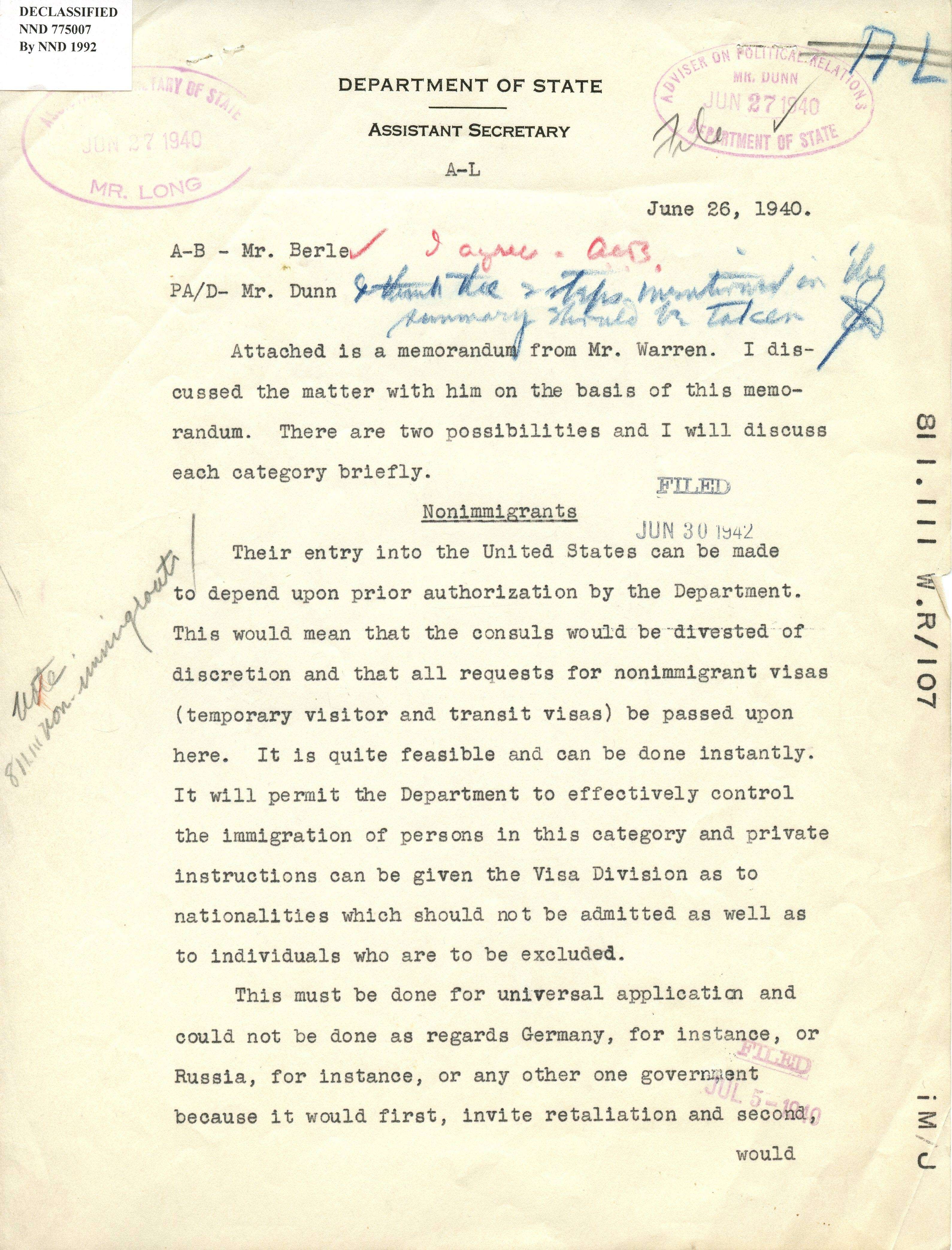
Memo from Assistant Secretary of State to State Department Officials on Temporarily Halting Immigration into the United States
Page 2
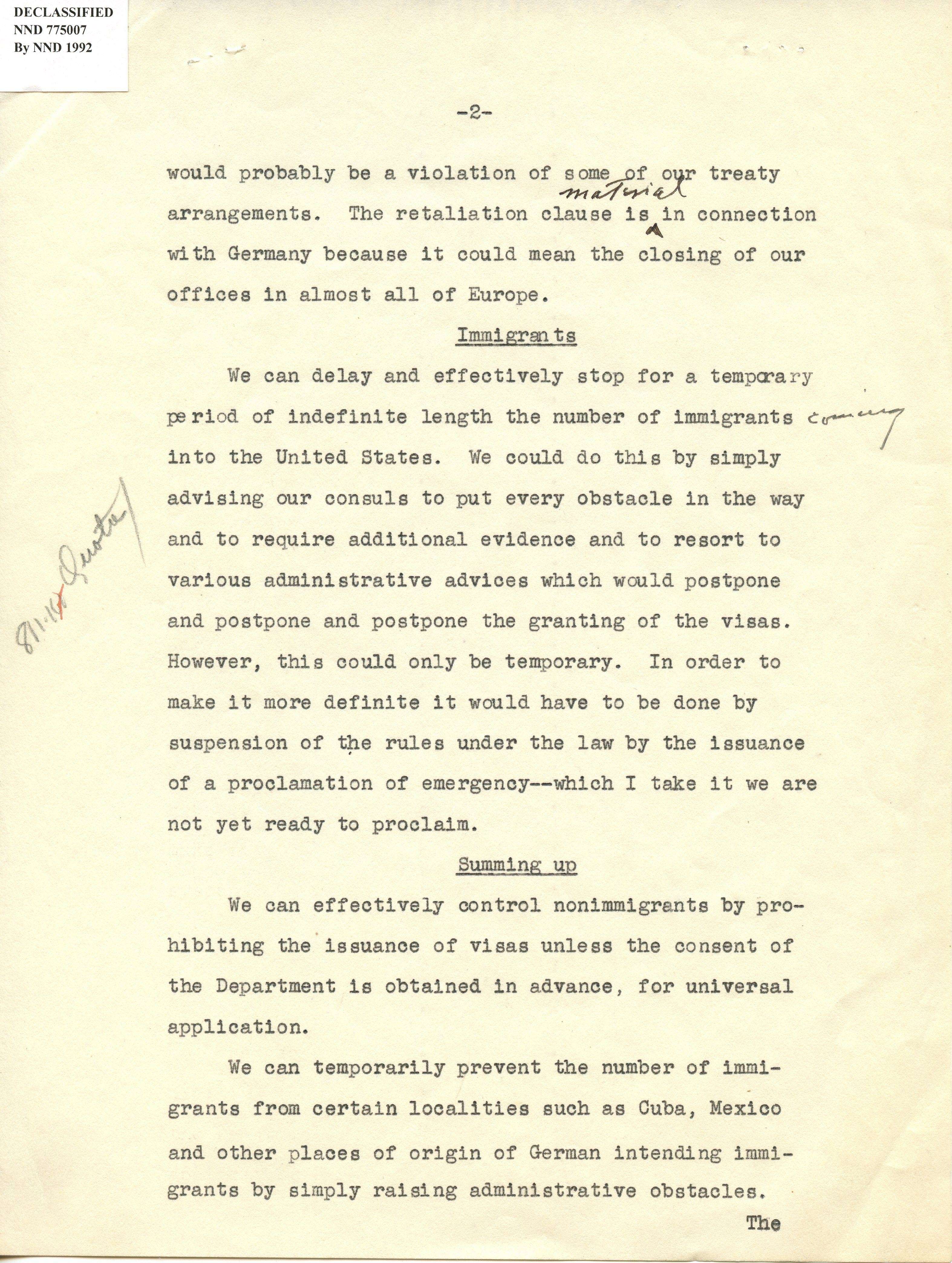
Memo from Assistant Secretary of State to State Department Officials on Temporarily Halting Immigration into the United States
Page 3
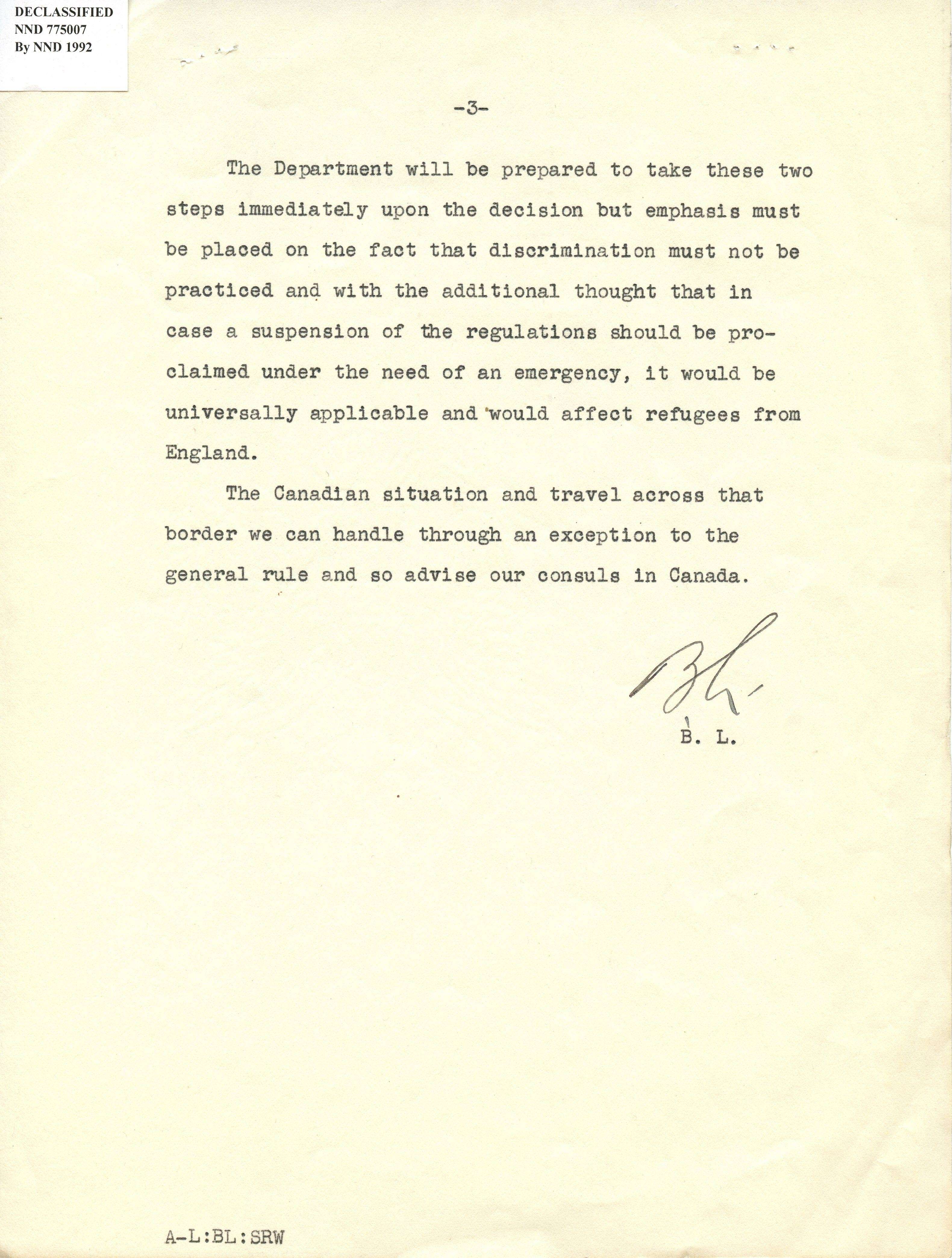
Memo from Assistant Secretary of State to State Department Officials on Temporarily Halting Immigration into the United States
Page 4
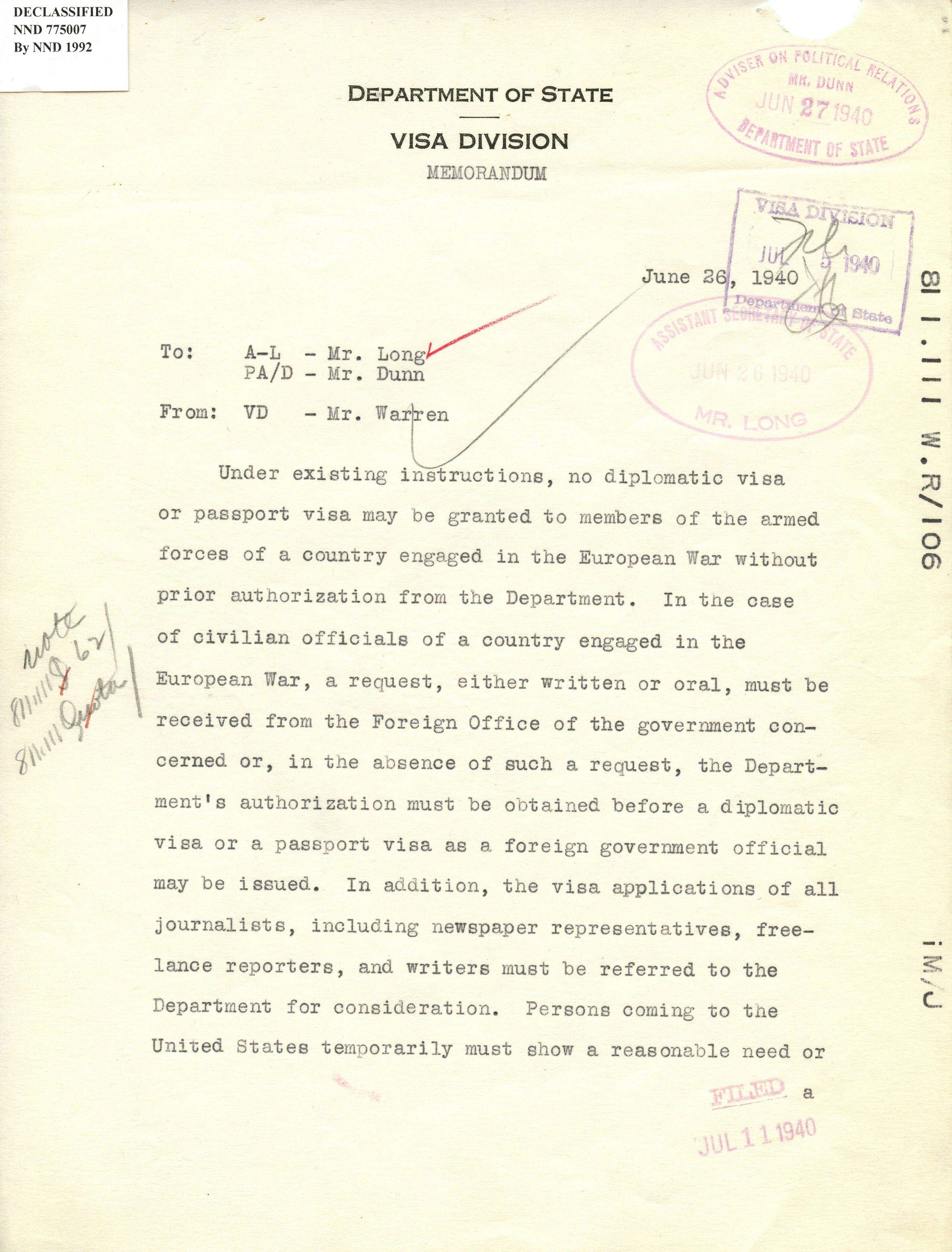
Memo from Assistant Secretary of State to State Department Officials on Temporarily Halting Immigration into the United States
Page 5
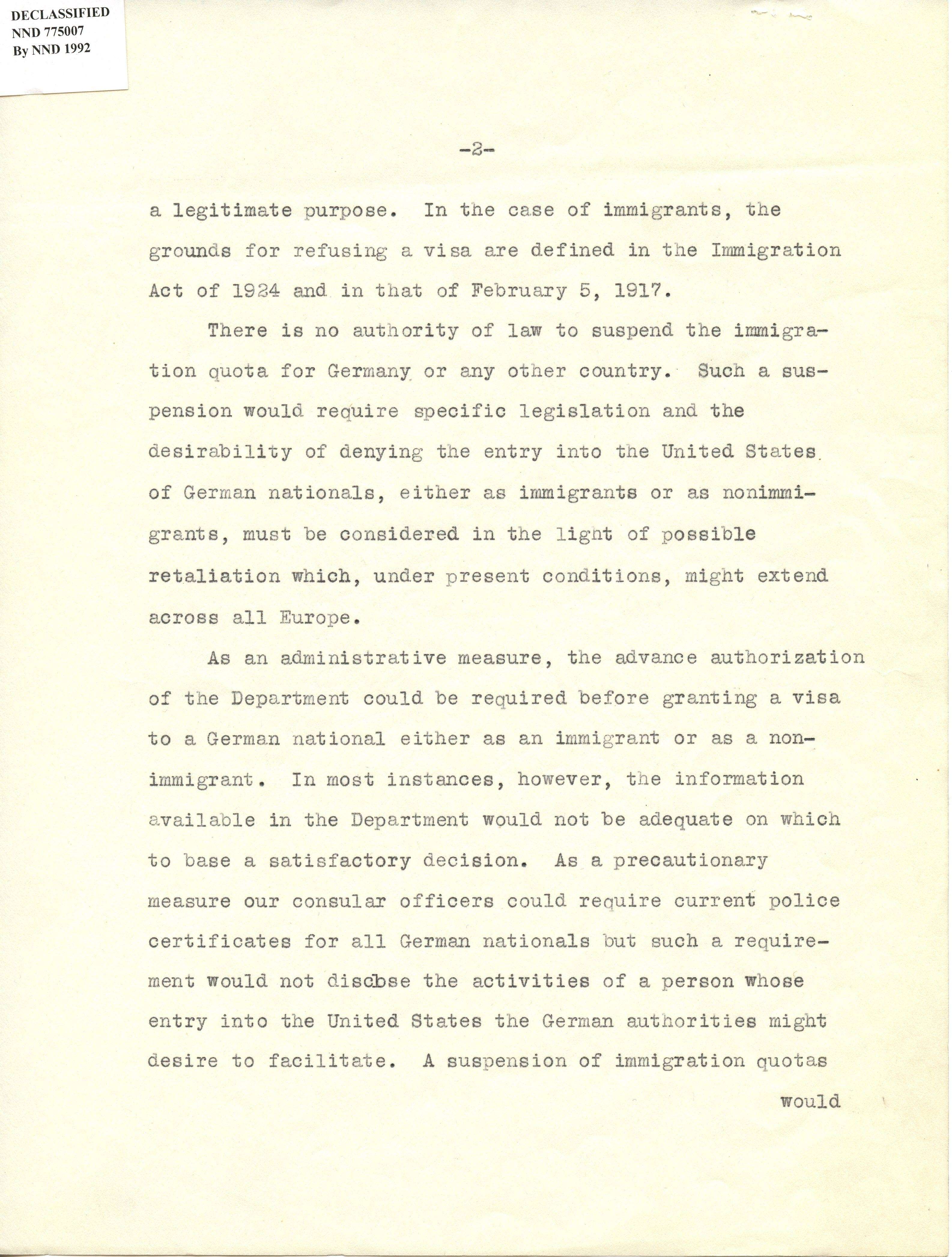
Memo from Assistant Secretary of State to State Department Officials on Temporarily Halting Immigration into the United States
Page 6
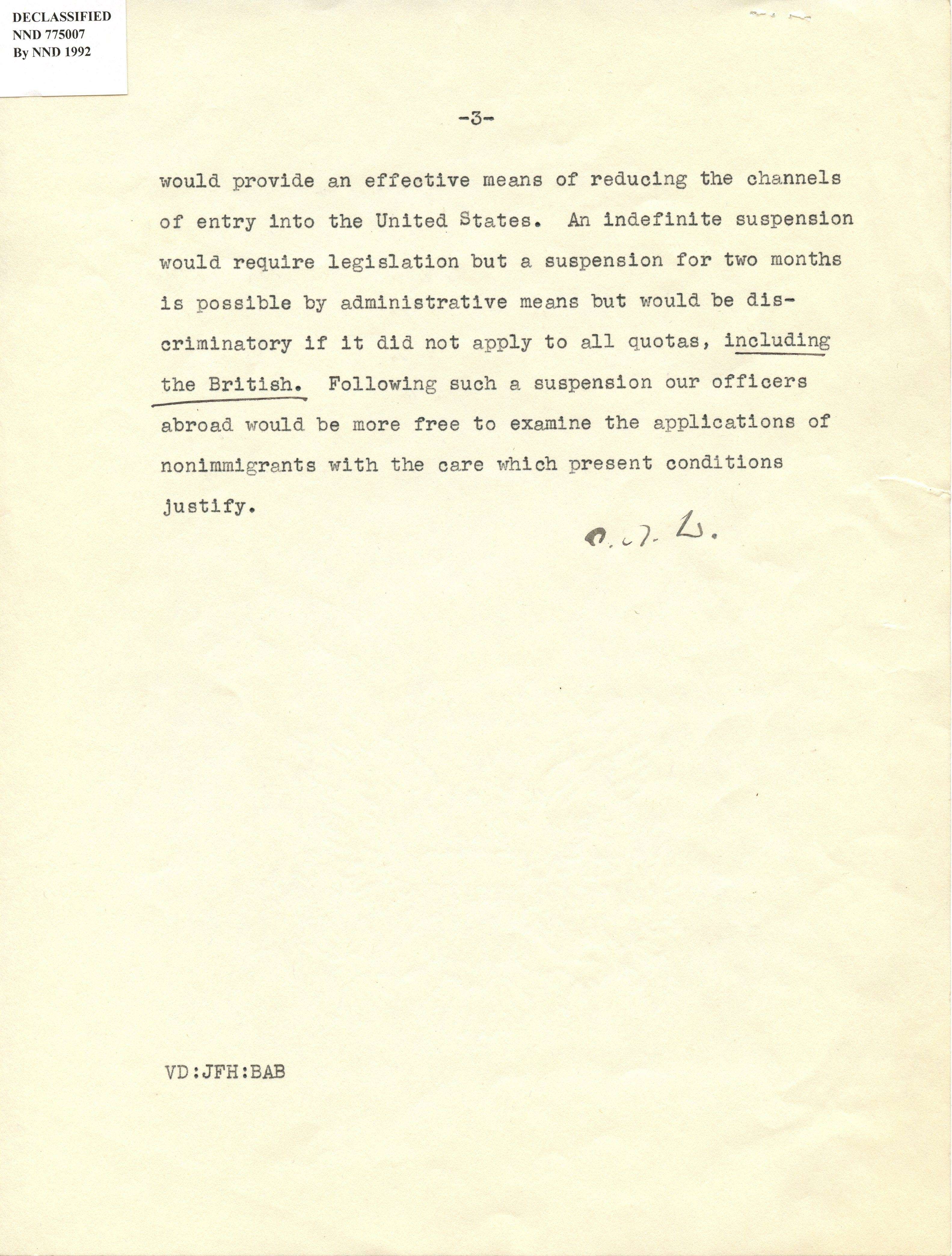
Document
Correspondence from Howard Elting to Secretary of State Cordell Hull with Enclosure concerning German extermination of Jews
8/10/1942
This correspondence from the Geneva consulate describes a conversation that the American Vice Consul Howard Elting, Jr. had with Gerhart M. Riegner, Secretary of the World Jewish Congress in early August 1942. Riegner relayed a report he received from a German businessman that there was a plan being discussed to exterminate all Jews in Germany and German-occupied territory. Riegner wanted this information to be shared with the Americans and their allies for confirmation and for it to be shared with Dr. Stephen Wise, President of the World Jewish Congress in New York.
Howard Elting, Jr., finding Riegner's account credible, relayed the conversation to the American Legation in Bern, Switzerland and eventually to the Secretary of State.
Riegner's message was not forwarded to Stephen Wise via the State Department, however. Leland Harrison, US Ambassador to Switzerland, called Riegner's report as having the "earmarks of war rumor inspired by fear." In addition, State Department officials called it "unsubstantiated" and that it would be unfair to the American public to share this story without some confirmation.
Riegner's message did make its way to Stephen Wise by the end of August 1942--he had shared the same details with the British Consulate in Geneva.
Howard Elting, Jr., finding Riegner's account credible, relayed the conversation to the American Legation in Bern, Switzerland and eventually to the Secretary of State.
Riegner's message was not forwarded to Stephen Wise via the State Department, however. Leland Harrison, US Ambassador to Switzerland, called Riegner's report as having the "earmarks of war rumor inspired by fear." In addition, State Department officials called it "unsubstantiated" and that it would be unfair to the American public to share this story without some confirmation.
Riegner's message did make its way to Stephen Wise by the end of August 1942--he had shared the same details with the British Consulate in Geneva.
This primary source comes from the General Records of the Department of State, 1763 - 2002.
National Archives Identifier: 6101792
Full Citation: Correspondence from Howard Elting to Secretary of State Cordell Hull with Enclosure concerning German extermination of Jews; 8/10/1942; 862.4016/2234; 862.4016; Central Decimal Files; General Records of the Department of State, 1763 - 2002, ; National Archives at College Park, College Park, MD. [Online Version, https://www.docsteach.org/documents/document/correspondence-elting-to-hull-holocaust, April 25, 2024]Correspondence from Howard Elting to Secretary of State Cordell Hull with Enclosure concerning German extermination of Jews
Page 1

Correspondence from Howard Elting to Secretary of State Cordell Hull with Enclosure concerning German extermination of Jews
Page 2

Correspondence from Howard Elting to Secretary of State Cordell Hull with Enclosure concerning German extermination of Jews
Page 3
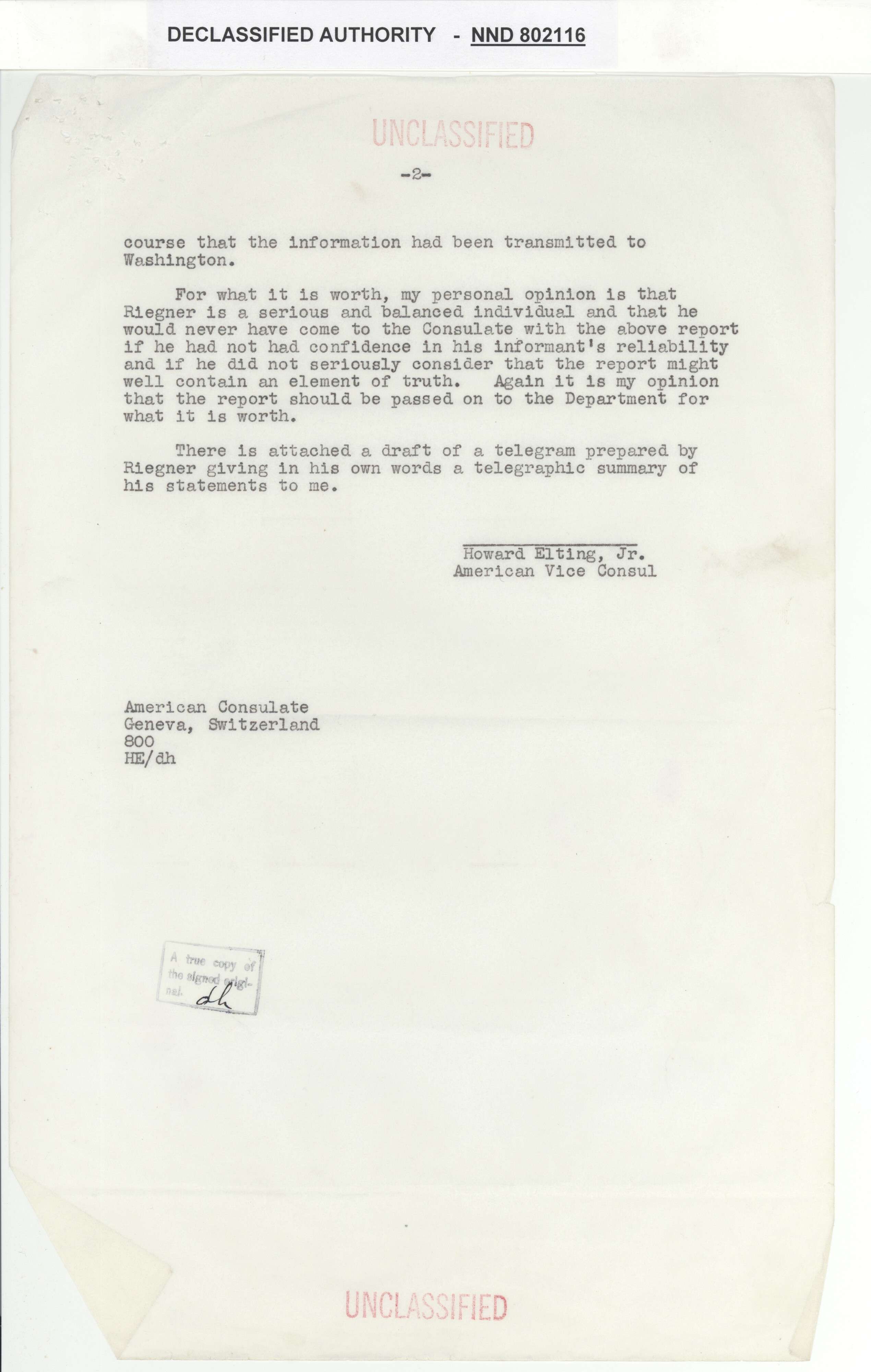
Correspondence from Howard Elting to Secretary of State Cordell Hull with Enclosure concerning German extermination of Jews
Page 4
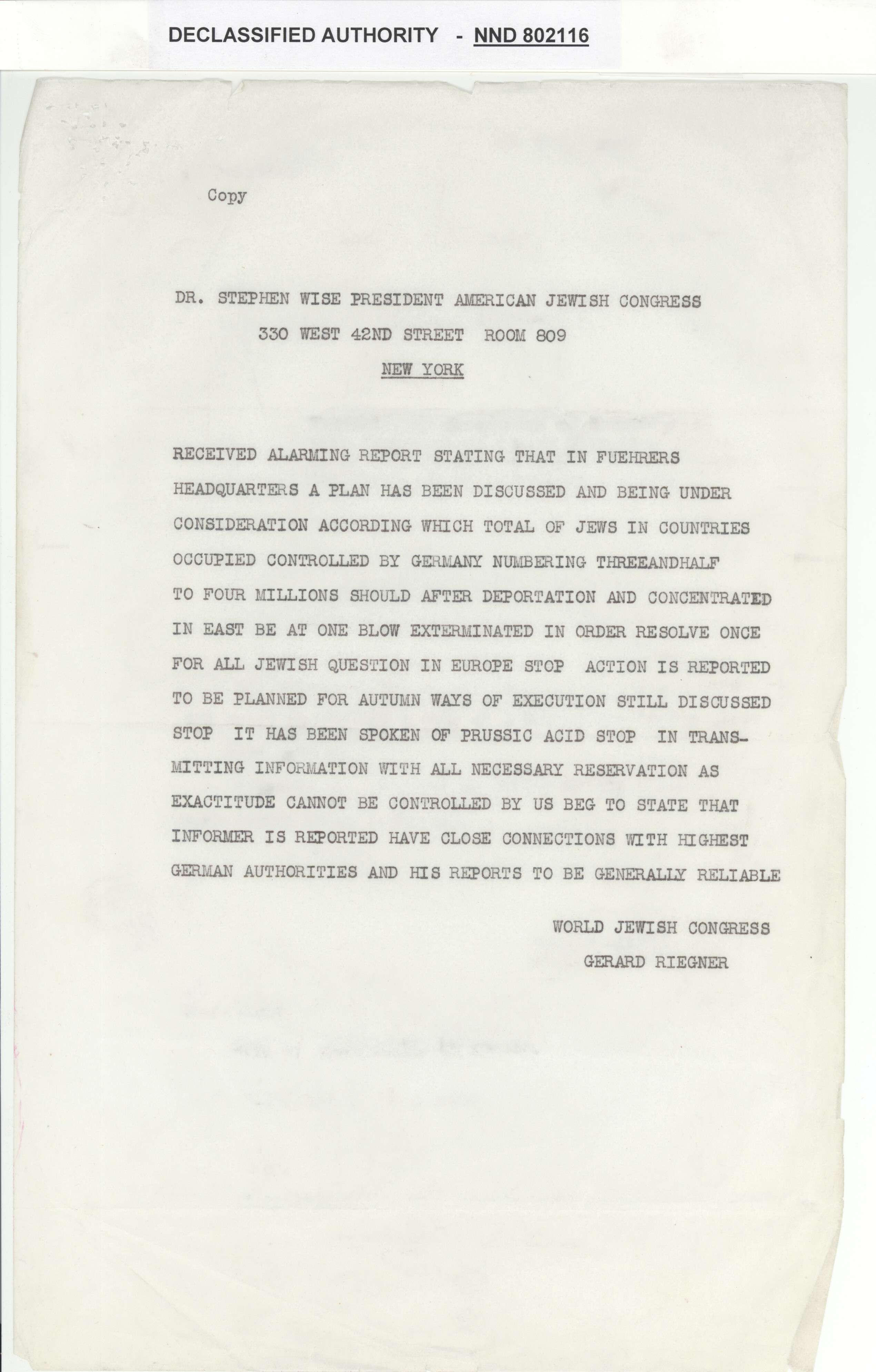
Document
Universal Newsreel Volume 17, Release 319
8/6/1944
This silent newsreel shows Jewish refugees arriving at the Fort Ontario Refugee Camp in Oswego, NY.
After the Nazis came to power in Germany in 1933, German and Austrian Jews tried in growing numbers to flee persecution. While about 250,000 would eventually come to the United States between 1933 and 1945, immigration officials applied regulations so rigidly, especially after the outbreak of World War II in 1939, that quotas for Germany and Austria were rarely filled.
About 1,000 refugees were picked to come to America to live in the newly established Fort Ontario Emergency Refugee Shelter in Oswego. The camp had been established by President Roosevelt to respond to political pressures to do more to help Jews in Europe and to sidestep immigration regulations. Initially, refugees had to promise to return to Europe when the war was over, but President Truman permitted the refugees to stay in the United States.
After the Nazis came to power in Germany in 1933, German and Austrian Jews tried in growing numbers to flee persecution. While about 250,000 would eventually come to the United States between 1933 and 1945, immigration officials applied regulations so rigidly, especially after the outbreak of World War II in 1939, that quotas for Germany and Austria were rarely filled.
About 1,000 refugees were picked to come to America to live in the newly established Fort Ontario Emergency Refugee Shelter in Oswego. The camp had been established by President Roosevelt to respond to political pressures to do more to help Jews in Europe and to sidestep immigration regulations. Initially, refugees had to promise to return to Europe when the war was over, but President Truman permitted the refugees to stay in the United States.
This primary source comes from the Collection UN: MCA/Universal Pictures Collection.
National Archives Identifier: 234272774
Full Citation: Motion Picture 200-UN-17-319-5; Universal Newsreel Volume 17, Release 319; 8/6/1944; Motion Picture Releases of the Universal Newsreel Library, 1929 - 1967; Collection UN: MCA/Universal Pictures Collection, ; National Archives at College Park, College Park, MD. [Online Version, https://www.docsteach.org/documents/document/us-haven-from-war, April 25, 2024]Universal Newsreel Volume 17, Release 319
Page 1
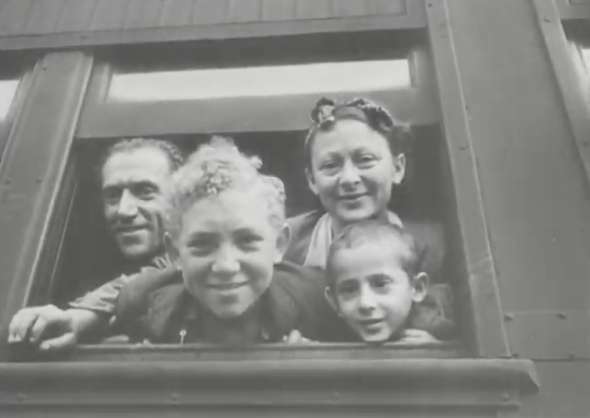
Document
Report to the Secretary on the Acquiescence of this Government in the Murder of the Jews
1/13/1944
This "Report to the Secretary on the Acquiescence of this Government in the Murder of the Jews" was drafted at the request of Treasury Secretary Henry Morgenthau, Jr. by two Treasury Department officials: Chief Counsel of Foreign Funds Control Josiah DuBois and Director of Foreign Funds Control John Pehle. It was in response to reports that Morgenthau had received stating that the State Department was blocking attempts to rescue Jews from Nazi-occupied Europe.
In April 1943, the World Jewish Congress had asked the State Department for a license to use private funds to rescue Jews in France and Romania. The Foreign Funds Control Office at the Treasury Department had authority to issue such licenses, but the State Department had withheld the request and delayed action on it. Since 1940, the State Department, under the leadership of Assistant Secretary of State Breckinridge Long, had been using a variety of tactics to limit the numbers of refugees who could enter the United States as immigrants. In this instance, however, officials at State were intentionally blocking information, such as Gerhard Riegner’s telegram with evidence of the Nazi plan to exterminate the Jews of Europe (that was sent from Switzerland to the governments of Great Britain and the United States).
Word of the license delay leaked, and at a meeting in December 1943, Director Pehle brought the matter to the attention of Secretary Morgenthau. Morgenthau contacted the State Department to request copies of crucial cables but was refused. As a result, he requested that his staff prepare a thorough report on their findings. The 18-page report was presented to the Secretary on January 13, 1944.
Morgenthau and his staff presented a final version to President Franklin Roosevelt on January 16. At that meeting they requested the creation of a separate government body to organize the rescue of European refugees. On January 22, the President issued Executive Order 9417 creating the War Refugee Board. The Board was comprised of the Secretaries of the Departments of State, War, and Treasury. John Pehle was named Executive Director.
In April 1943, the World Jewish Congress had asked the State Department for a license to use private funds to rescue Jews in France and Romania. The Foreign Funds Control Office at the Treasury Department had authority to issue such licenses, but the State Department had withheld the request and delayed action on it. Since 1940, the State Department, under the leadership of Assistant Secretary of State Breckinridge Long, had been using a variety of tactics to limit the numbers of refugees who could enter the United States as immigrants. In this instance, however, officials at State were intentionally blocking information, such as Gerhard Riegner’s telegram with evidence of the Nazi plan to exterminate the Jews of Europe (that was sent from Switzerland to the governments of Great Britain and the United States).
Word of the license delay leaked, and at a meeting in December 1943, Director Pehle brought the matter to the attention of Secretary Morgenthau. Morgenthau contacted the State Department to request copies of crucial cables but was refused. As a result, he requested that his staff prepare a thorough report on their findings. The 18-page report was presented to the Secretary on January 13, 1944.
Morgenthau and his staff presented a final version to President Franklin Roosevelt on January 16. At that meeting they requested the creation of a separate government body to organize the rescue of European refugees. On January 22, the President issued Executive Order 9417 creating the War Refugee Board. The Board was comprised of the Secretaries of the Departments of State, War, and Treasury. John Pehle was named Executive Director.
This primary source comes from the Collection FDR-MORGEN: Henry Morgenthau, Jr. Papers.
National Archives Identifier: 28277400
Full Citation: Report to the Secretary on the Acquiescence of this Government in the Murder of the Jews; 1/13/1944; Volume 693, January 11 – January 13, 1944; Diaries of Henry Morgenthau, Jr., 4/27/1933 - 7/21/1945; Collection FDR-MORGEN: Henry Morgenthau, Jr. Papers, ; Franklin D. Roosevelt Library, Hyde Park, NY. [Online Version, https://www.docsteach.org/documents/document/acquiescence-memo, April 25, 2024]Report to the Secretary on the Acquiescence of this Government in the Murder of the Jews
Page 1

Report to the Secretary on the Acquiescence of this Government in the Murder of the Jews
Page 2
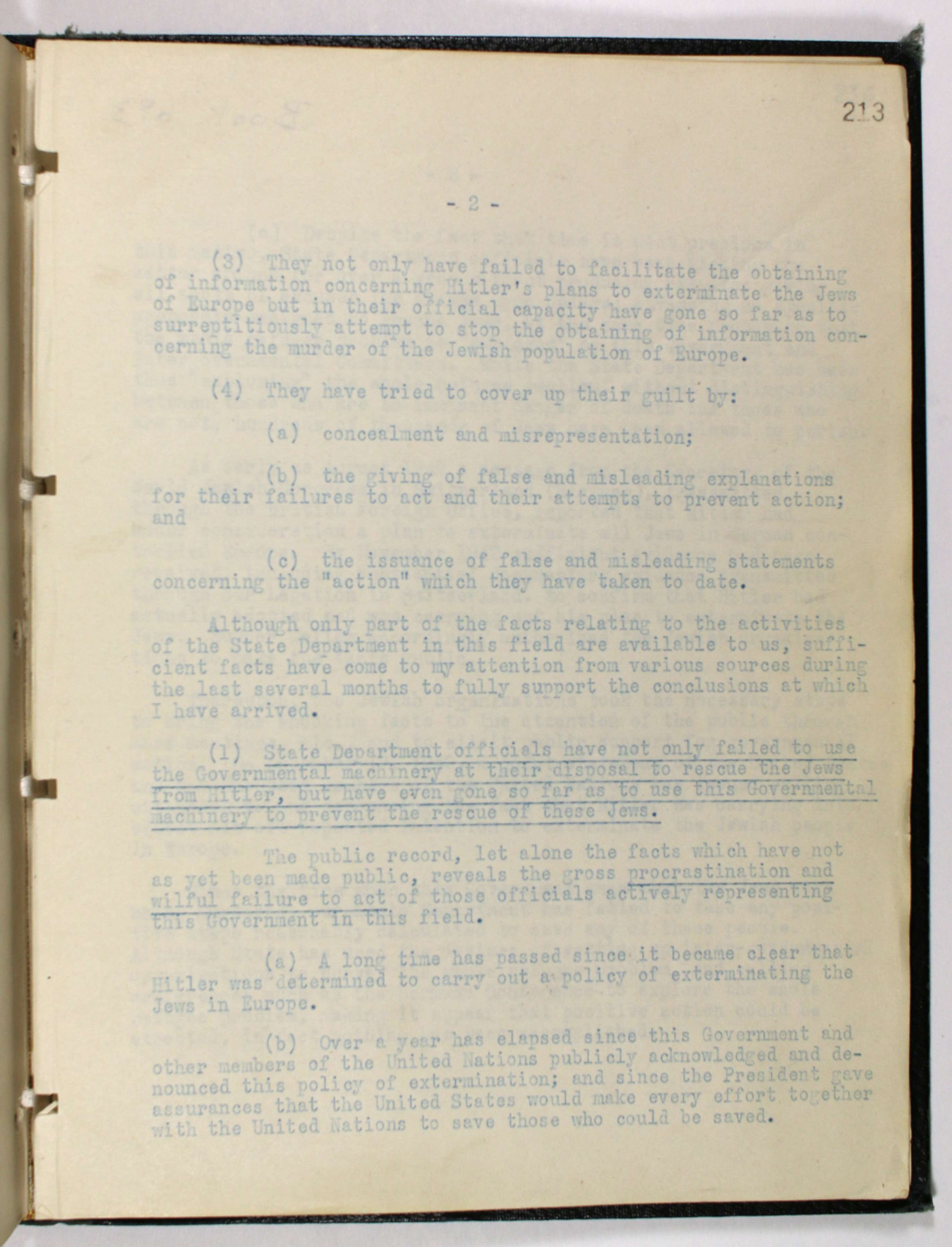
Report to the Secretary on the Acquiescence of this Government in the Murder of the Jews
Page 3
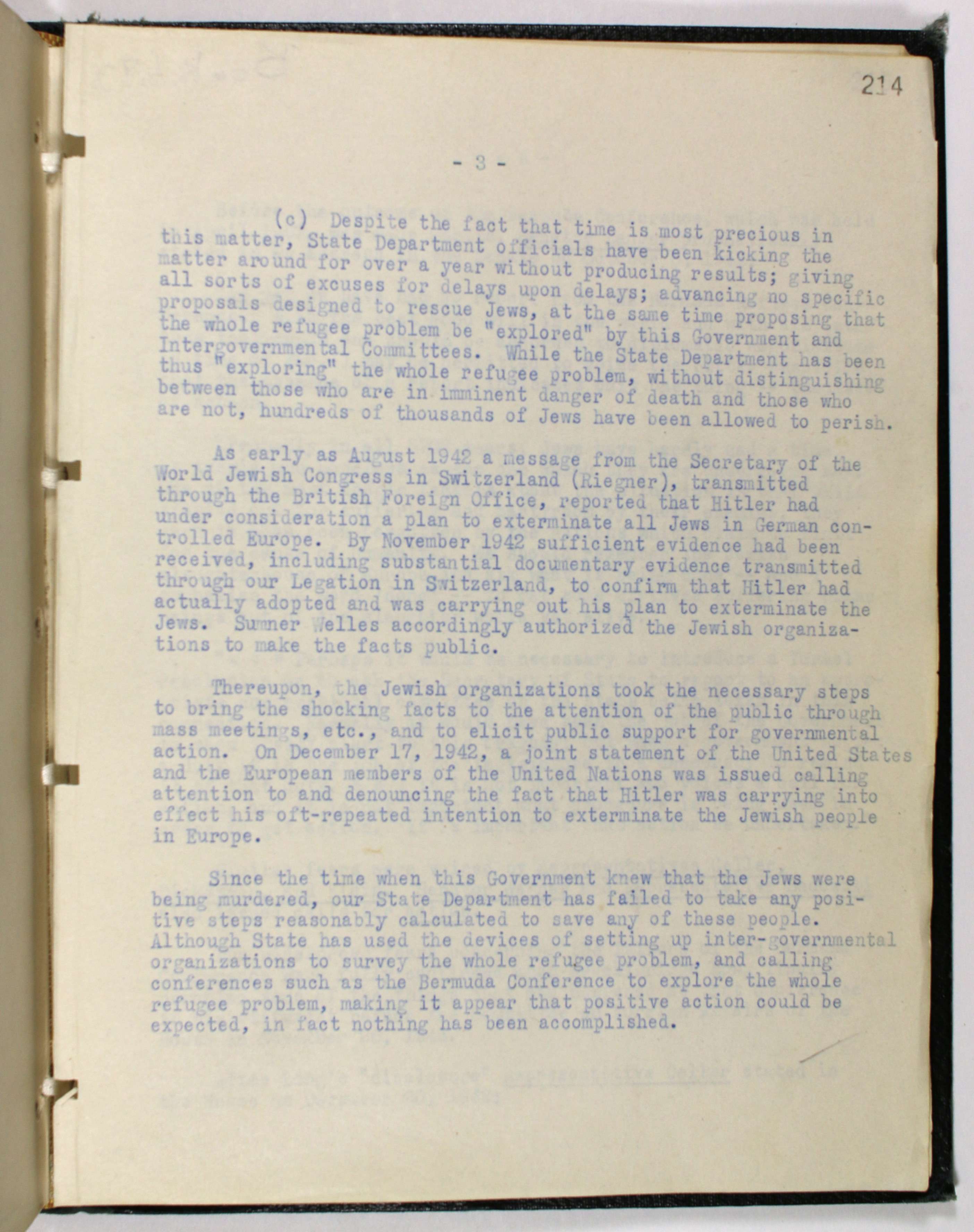
Report to the Secretary on the Acquiescence of this Government in the Murder of the Jews
Page 4
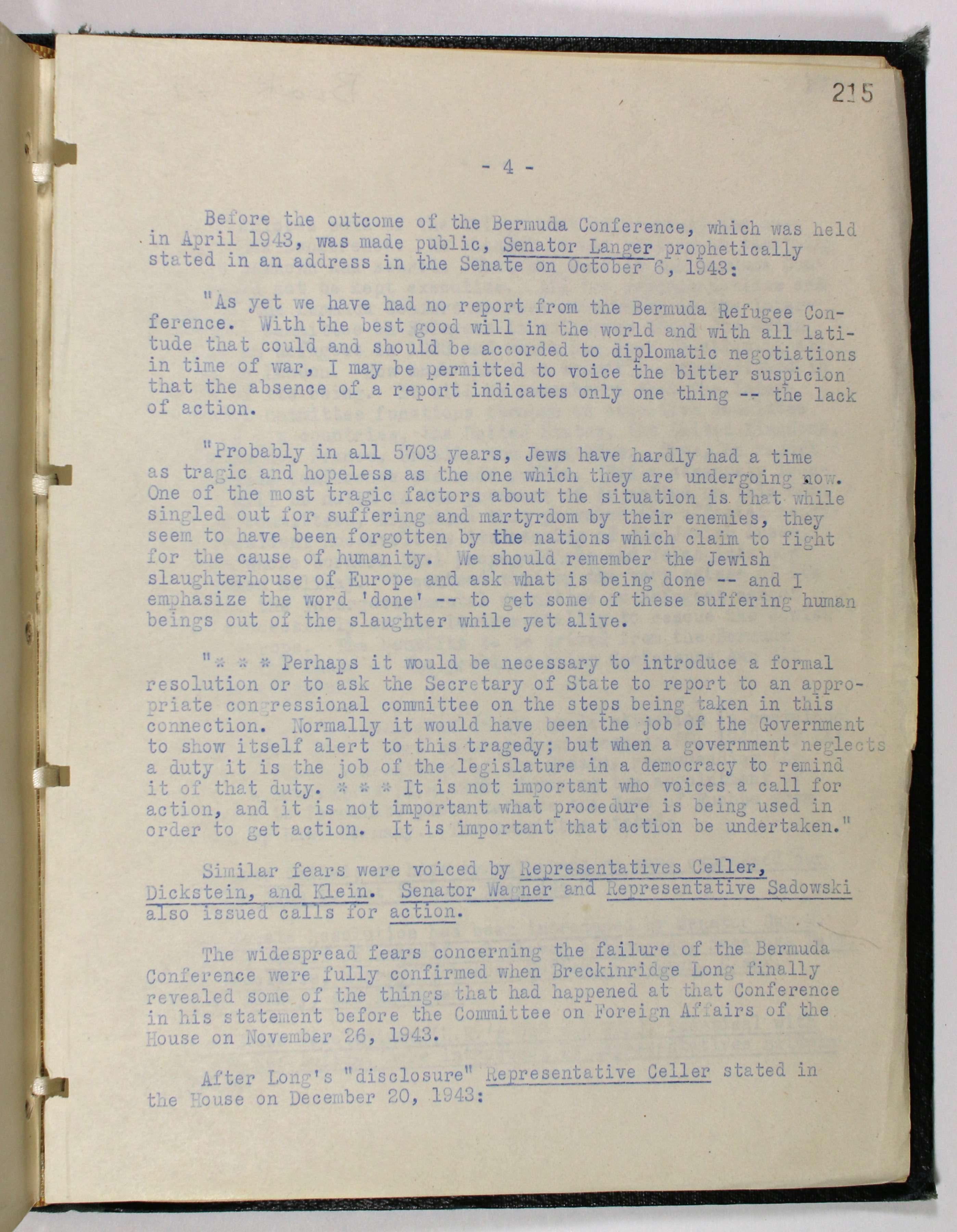
Report to the Secretary on the Acquiescence of this Government in the Murder of the Jews
Page 5
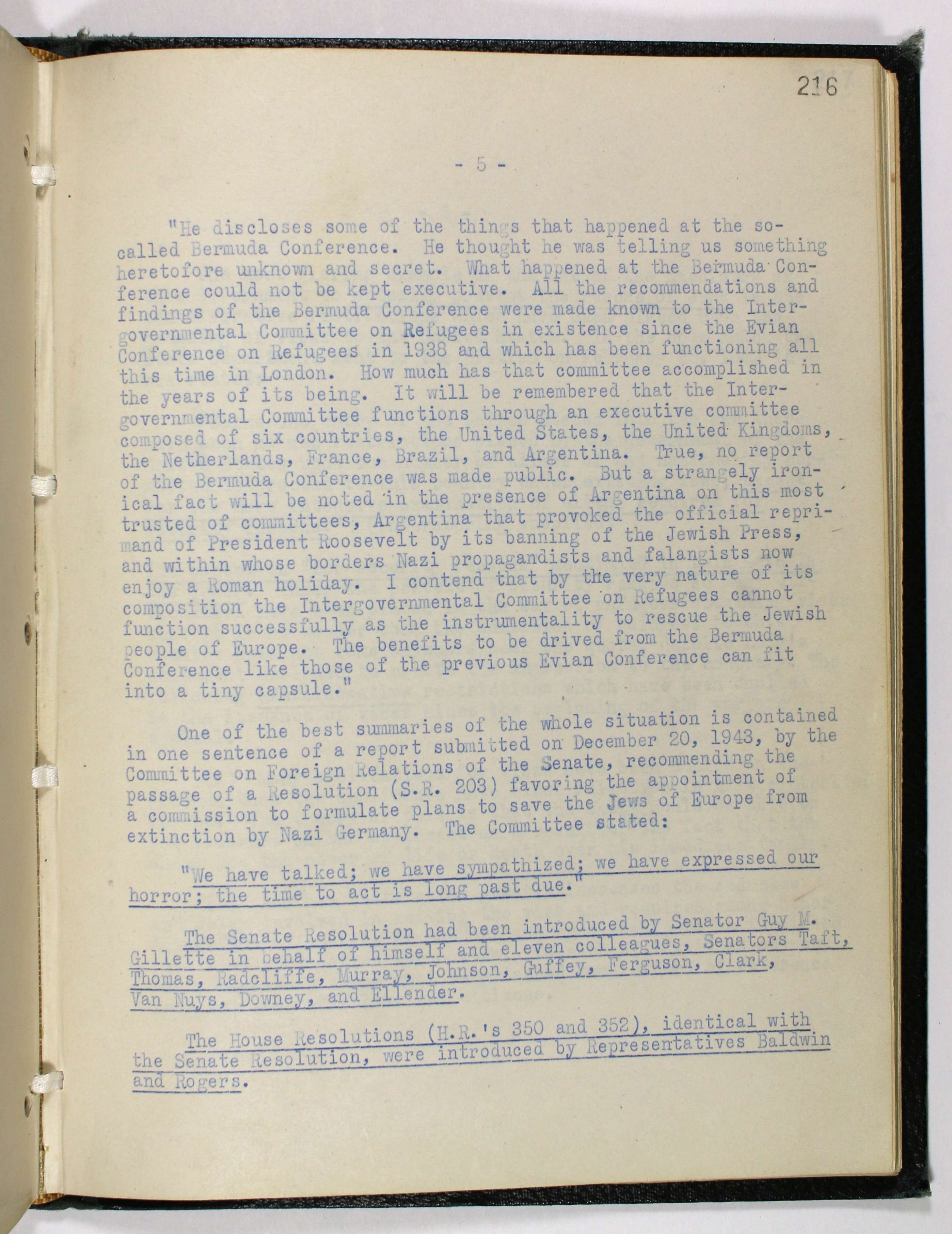
Report to the Secretary on the Acquiescence of this Government in the Murder of the Jews
Page 6
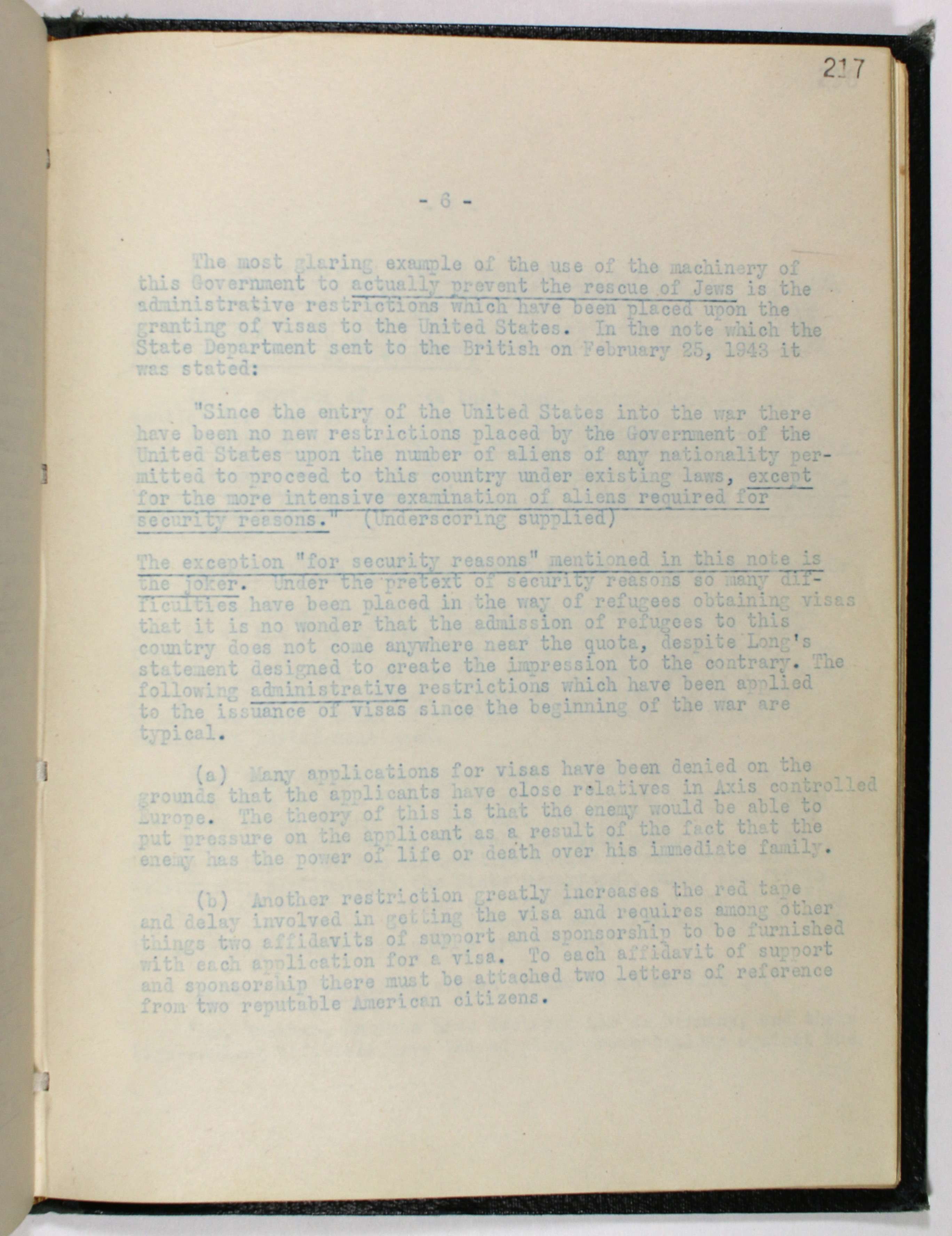
Report to the Secretary on the Acquiescence of this Government in the Murder of the Jews
Page 7

Report to the Secretary on the Acquiescence of this Government in the Murder of the Jews
Page 8
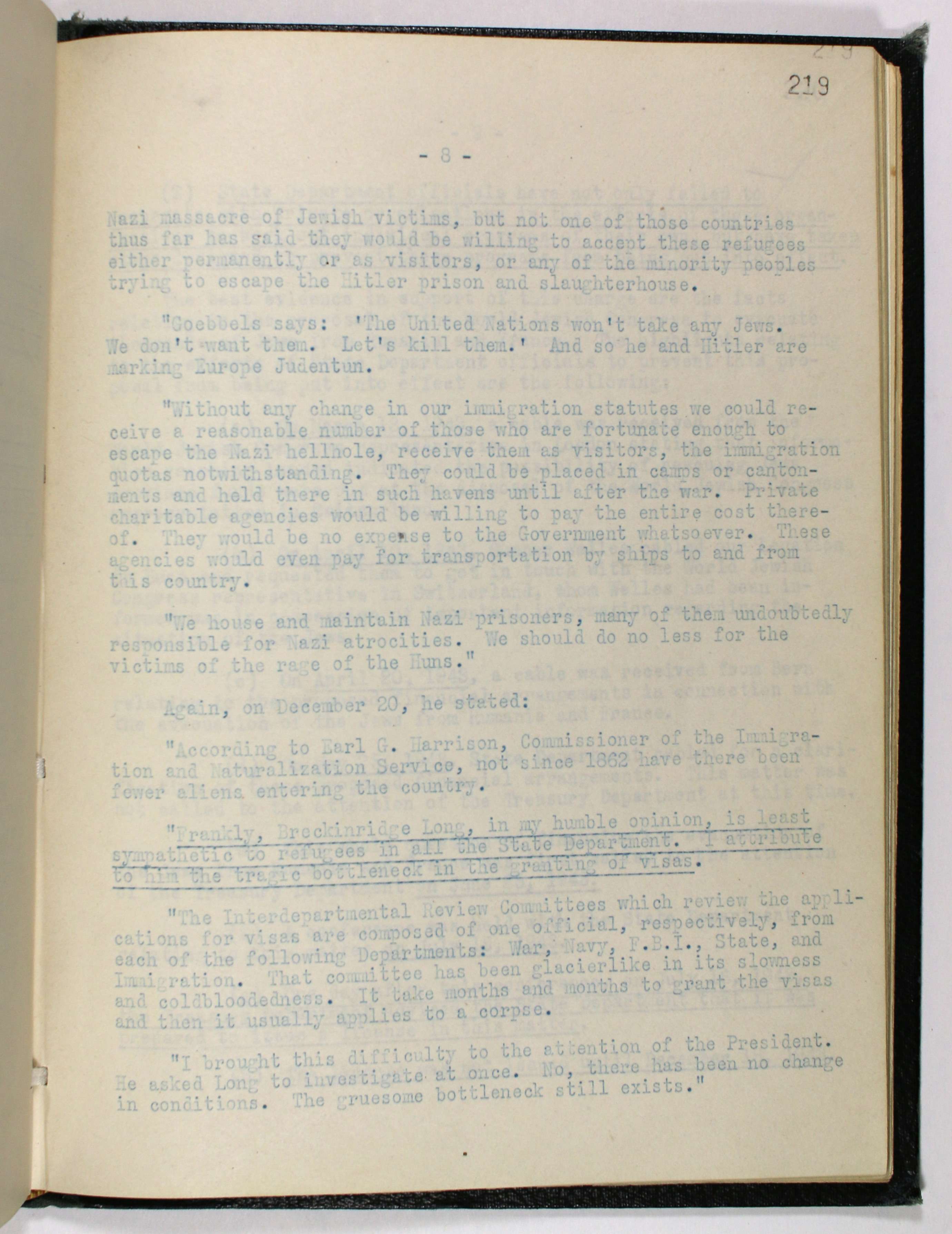
Report to the Secretary on the Acquiescence of this Government in the Murder of the Jews
Page 9
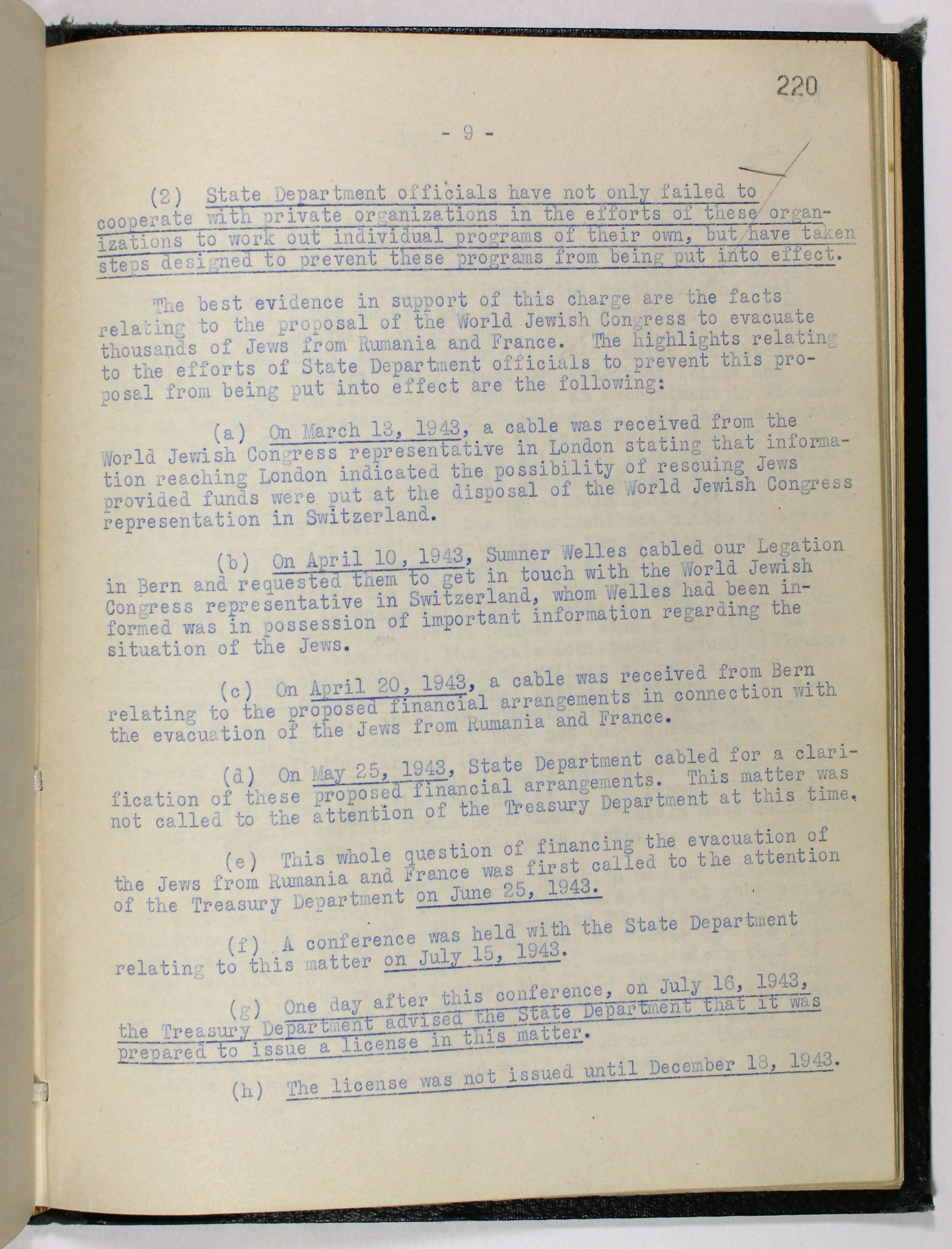
Report to the Secretary on the Acquiescence of this Government in the Murder of the Jews
Page 10
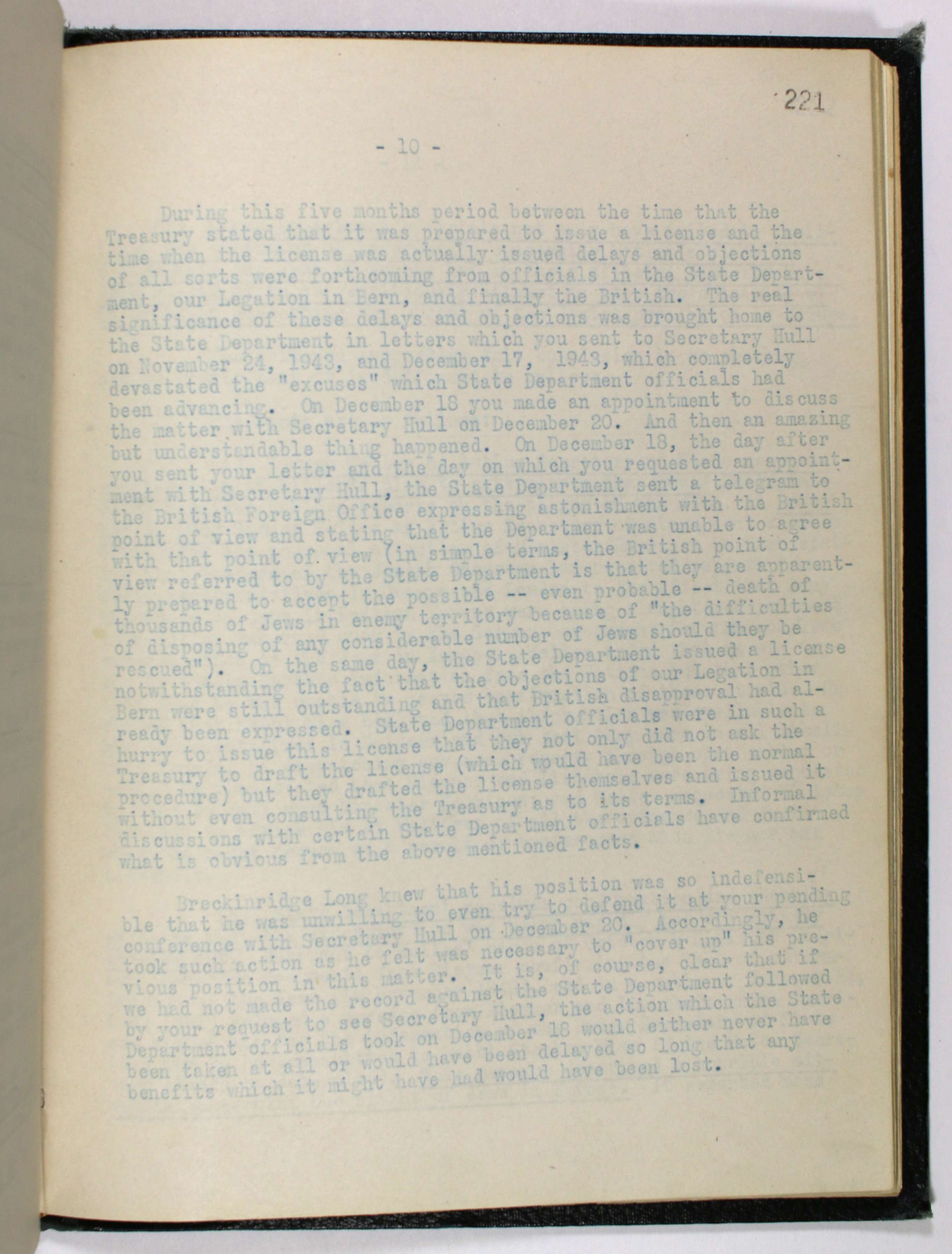
Report to the Secretary on the Acquiescence of this Government in the Murder of the Jews
Page 11

Report to the Secretary on the Acquiescence of this Government in the Murder of the Jews
Page 12
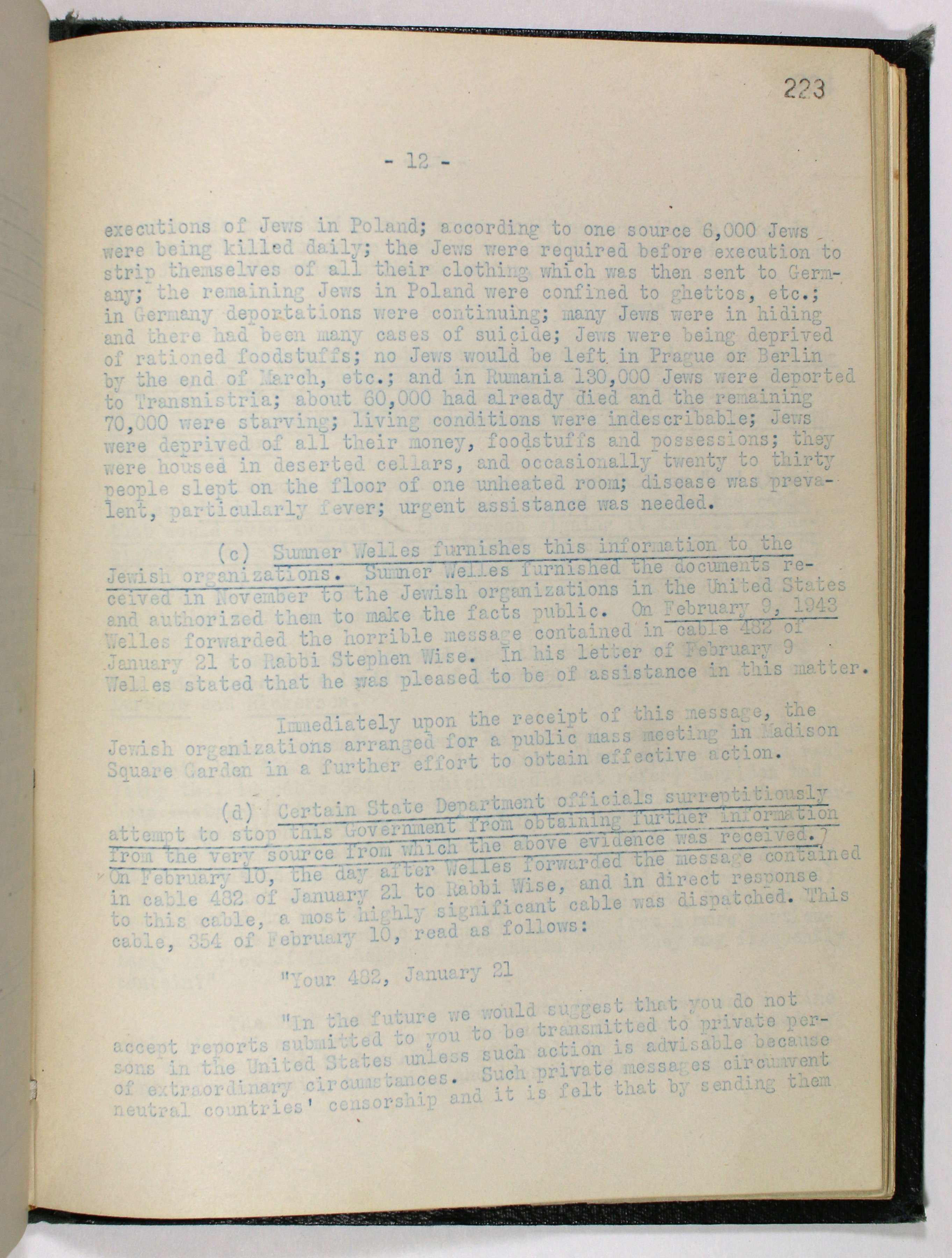
Report to the Secretary on the Acquiescence of this Government in the Murder of the Jews
Page 13

Report to the Secretary on the Acquiescence of this Government in the Murder of the Jews
Page 14
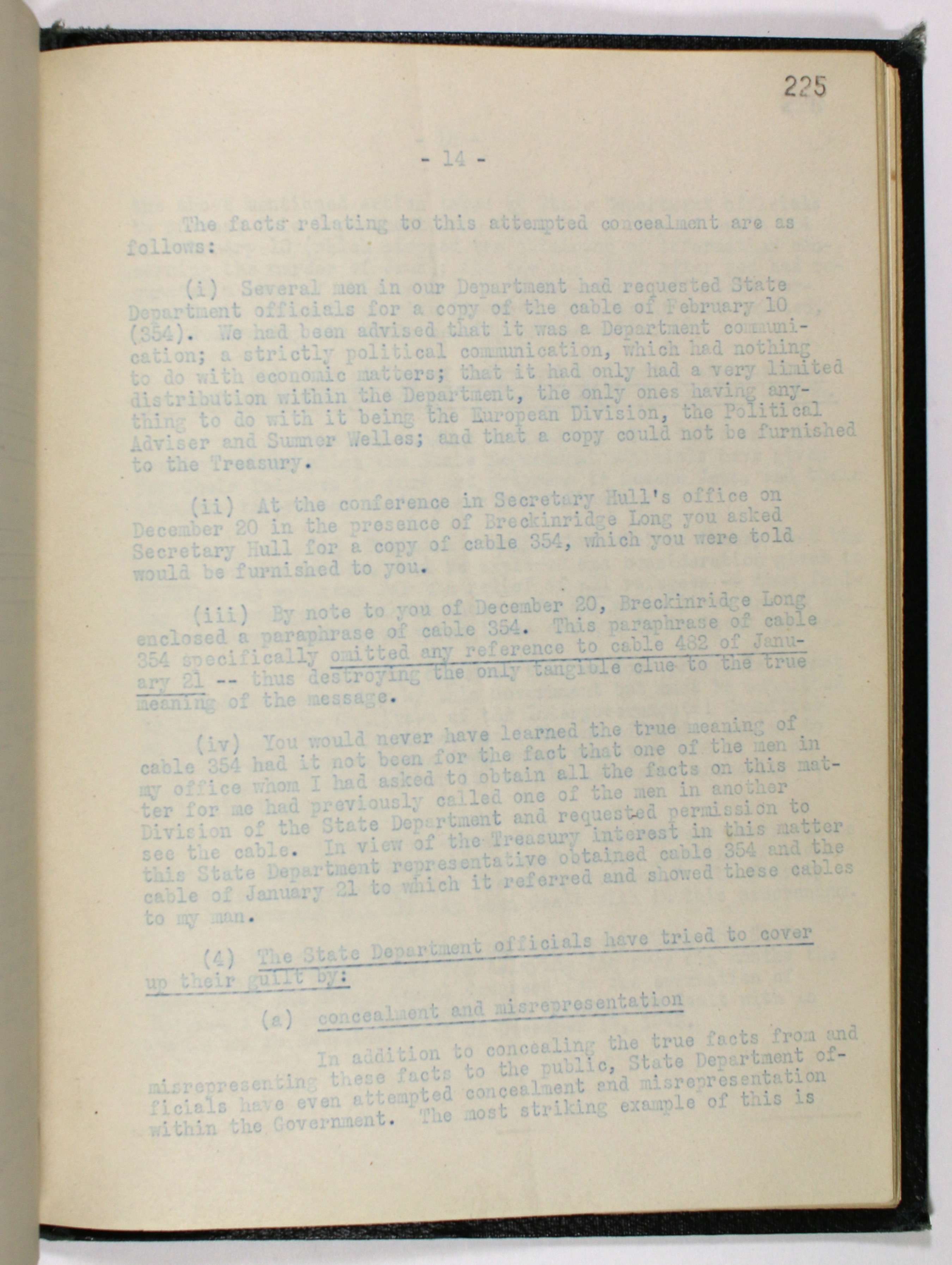
Report to the Secretary on the Acquiescence of this Government in the Murder of the Jews
Page 15
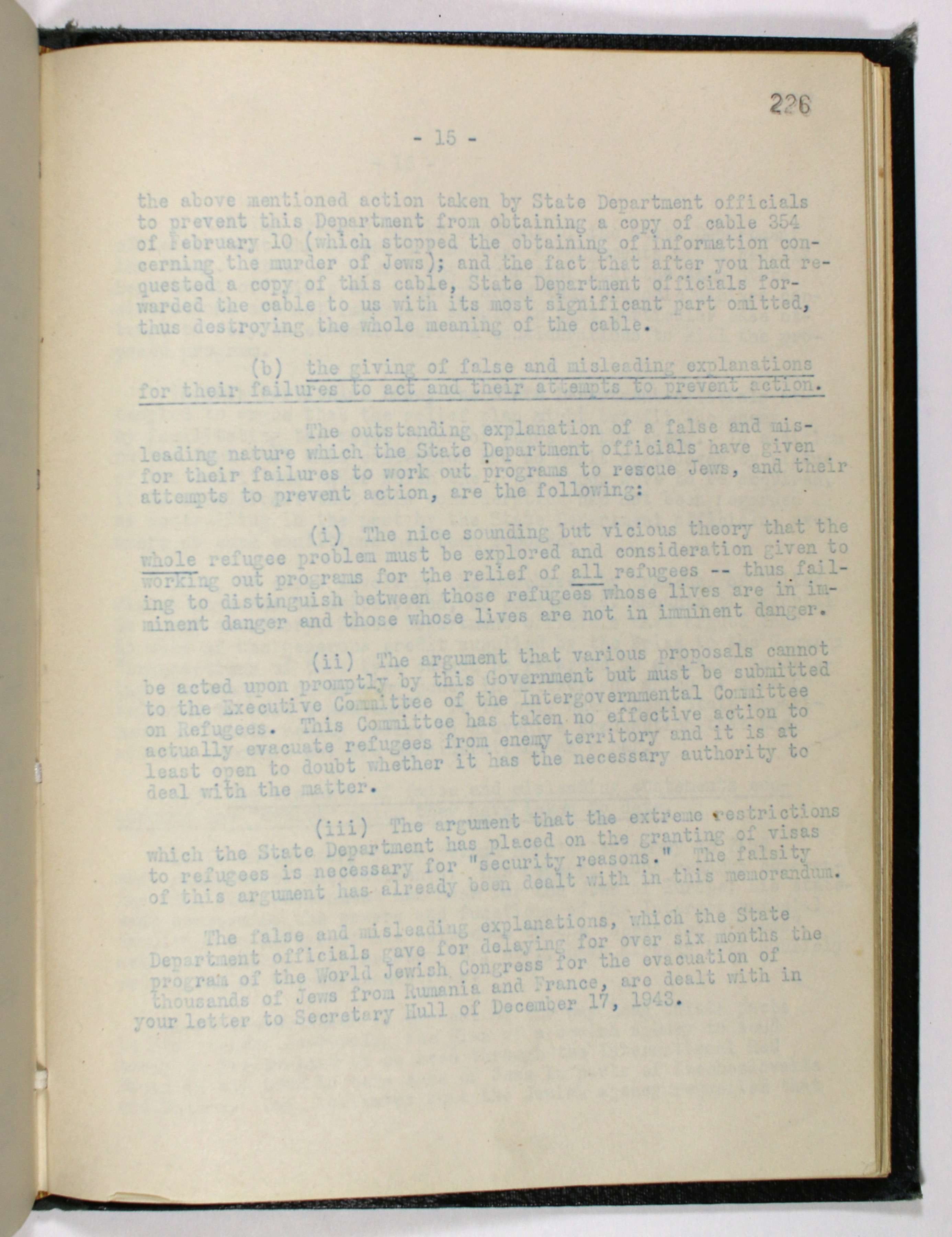
Report to the Secretary on the Acquiescence of this Government in the Murder of the Jews
Page 16

Report to the Secretary on the Acquiescence of this Government in the Murder of the Jews
Page 17

Report to the Secretary on the Acquiescence of this Government in the Murder of the Jews
Page 18

Document
Draft Statement by the President of the United States Regarding War Crimes
3/24/1944
President Franklin D. Roosevelt issued this statement about the Holocaust during World War II, calling "the systematic torture and murder of innocent civilians...by the Nazis and the Japanese"..."one of the blackest crimes in all history." FDR stated that "the wholesale systematic murder of the Jews of Europe...goes on unabated every hour."
He proclaimed "that none who participate in such acts of savagery shall go unpunished" and that the "United Nations have made it clear that they will pursue the guilty." He stated that the "United States will persevere in its efforts to rescue the victims of brutality of the Nazis and the Japs" vowing that "this Government will use all means at its command to aid the escape of Jews and other intended victims of the Nazi and Japanese executioner" and "shall find havens of refuge for them."
President Roosevelt issued this statement about the Holocaust at the urging of the War Refugee Board. Roosevelt had created the Board through Executive Order 9417. Its job was to coordinate governmental and private efforts to rescue those who could still be saved from the Holocaust.
He proclaimed "that none who participate in such acts of savagery shall go unpunished" and that the "United Nations have made it clear that they will pursue the guilty." He stated that the "United States will persevere in its efforts to rescue the victims of brutality of the Nazis and the Japs" vowing that "this Government will use all means at its command to aid the escape of Jews and other intended victims of the Nazi and Japanese executioner" and "shall find havens of refuge for them."
President Roosevelt issued this statement about the Holocaust at the urging of the War Refugee Board. Roosevelt had created the Board through Executive Order 9417. Its job was to coordinate governmental and private efforts to rescue those who could still be saved from the Holocaust.
This primary source comes from the Collection FDR-PPF: Papers as President, President's Personal File.
Full Citation: Draft Statement by the President of the United States Regarding War Crimes; 3/24/1944; PPF 1-F: Press Releases; President's Personal Files, 1933 - 1945; Collection FDR-PPF: Papers as President, President's Personal File, ; Franklin D. Roosevelt Library, Hyde Park, NY. [Online Version, https://www.docsteach.org/documents/document/statement-war-crimes, April 25, 2024]Draft Statement by the President of the United States Regarding War Crimes
Page 1
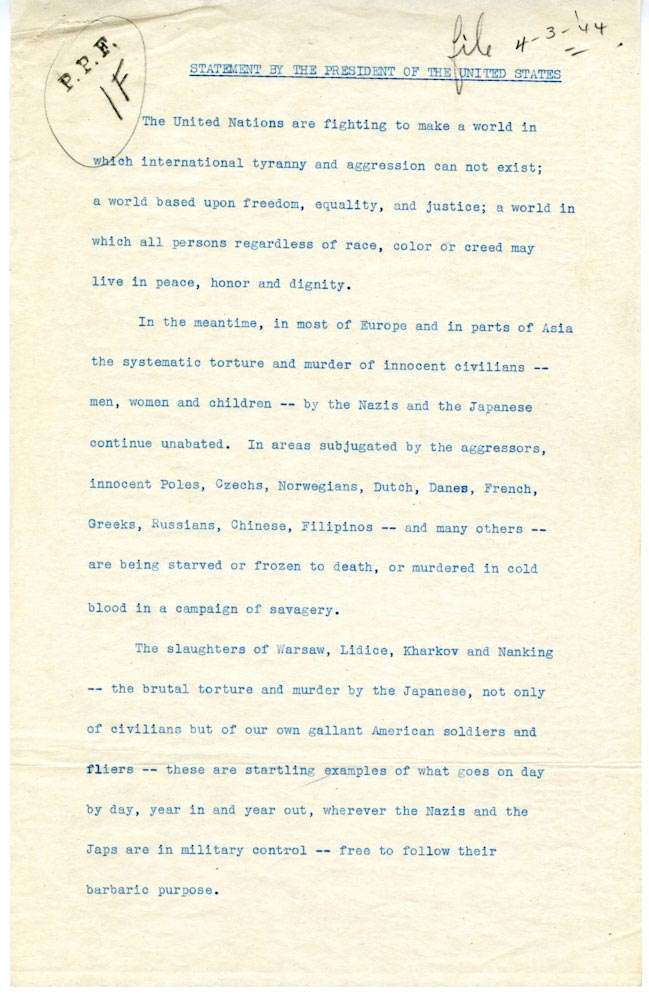
Draft Statement by the President of the United States Regarding War Crimes
Page 2

Draft Statement by the President of the United States Regarding War Crimes
Page 3

Document
Unemployed men queued outside a depression soup kitchen opened in Chicago by Al Capone
02/1931
The storefront sign reads "Free Soup, Coffee and Doughnuts for the Unemployed."
This primary source comes from the Records of the U.S. Information Agency.
National Archives Identifier: 541927
Full Citation: Unemployed men queued outside a depression soup kitchen opened in Chicago by Al Capone; 02/1931; Records of the U.S. Information Agency, . [Online Version, https://www.docsteach.org/documents/document/unemployed-men-queued-outside-a-depression-soup-kitchen-opened-in-chicago-by-al-capone, April 25, 2024]Unemployed men queued outside a depression soup kitchen opened in Chicago by Al Capone
Page 1
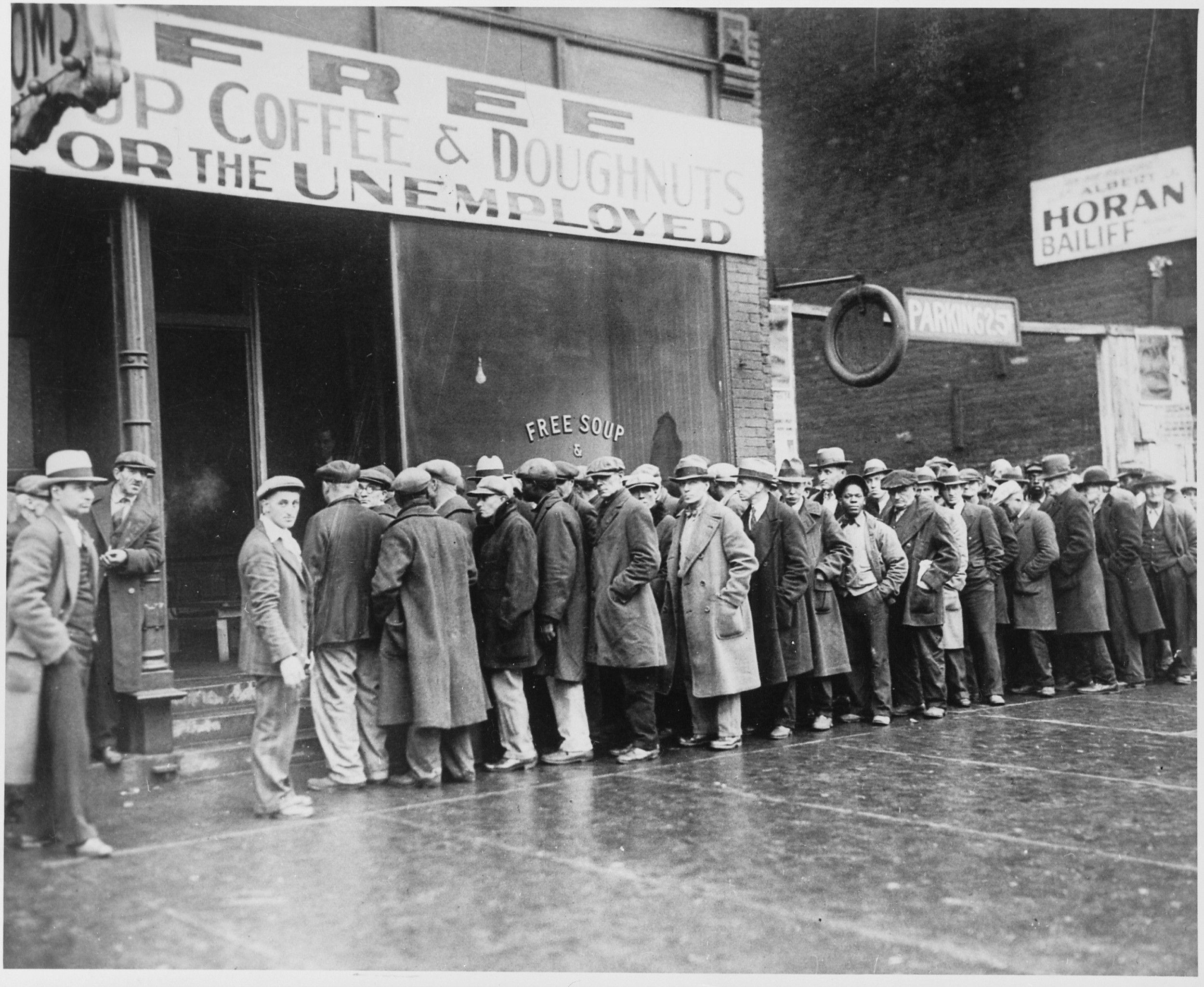
Document
Selected Emigration Trends, Jewish Emigration from Europe, 1926-1942, as Percentage of Total Jewish Emigrants
11/1945
This map shows Jewish emigration from Europe from 1926-1942 as a percentage of total Jewish emigrants. It comes from an Atlas of Population and Migration Trends created by the War Department that contains population, emigration, and immigration data from the 18th and 19th centuries, and population estimates to 1970.
This primary source comes from the Records of the Office of Strategic Services.
National Archives Identifier: 6704476
Full Citation: Selected Emigration Trends, Jewish Emigration from Europe, 1926-1942, as Percentage of Total Jewish Emigrants; 11/1945; page 35; Atlas of Population and Migration Trends, 11/1945 - 11/1945; Records of the Office of Strategic Services, ; National Archives at College Park, College Park, MD. [Online Version, https://www.docsteach.org/documents/document/jewish-emigration-europe-1926-1942, April 25, 2024]Selected Emigration Trends, Jewish Emigration from Europe, 1926-1942, as Percentage of Total Jewish Emigrants
Page 1
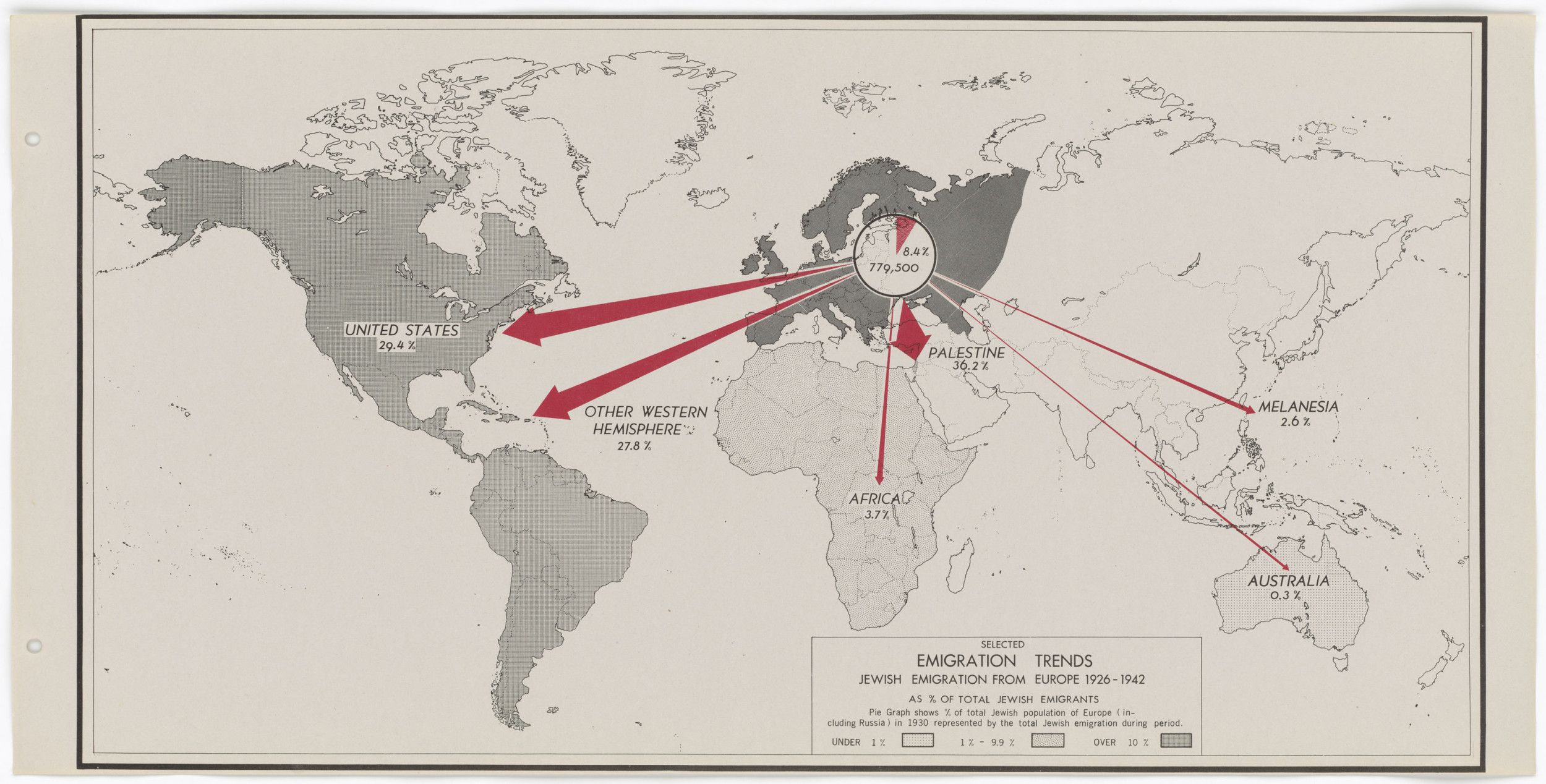
Document
Selected Emigration Trends, Jewish Emigration from Europe, 1885-1925, as Percentage of Total Jewish Emigrants
11/1945
This map shows Jewish emigration from Europe from 1885-1925 as a percentage of total Jewish emigrants. It comes from an Atlas of Population and Migration Trends created by the War Department that contains population, emigration, and immigration data from the 18th and 19th centuries, and population estimates to 1970.
This primary source comes from the Records of the Office of Strategic Services.
National Archives Identifier: 6704475
Full Citation: Selected Emigration Trends, Jewish Emigration from Europe, 1885-1925, as Percentage of Total Jewish Emigrants; 11/1945; page 34; Atlas of Population and Migration Trends, 11/1945 - 11/1945; Records of the Office of Strategic Services, ; National Archives at College Park, College Park, MD. [Online Version, https://www.docsteach.org/documents/document/jewish-emigration-from-europe-1885-1925, April 25, 2024]Selected Emigration Trends, Jewish Emigration from Europe, 1885-1925, as Percentage of Total Jewish Emigrants
Page 1
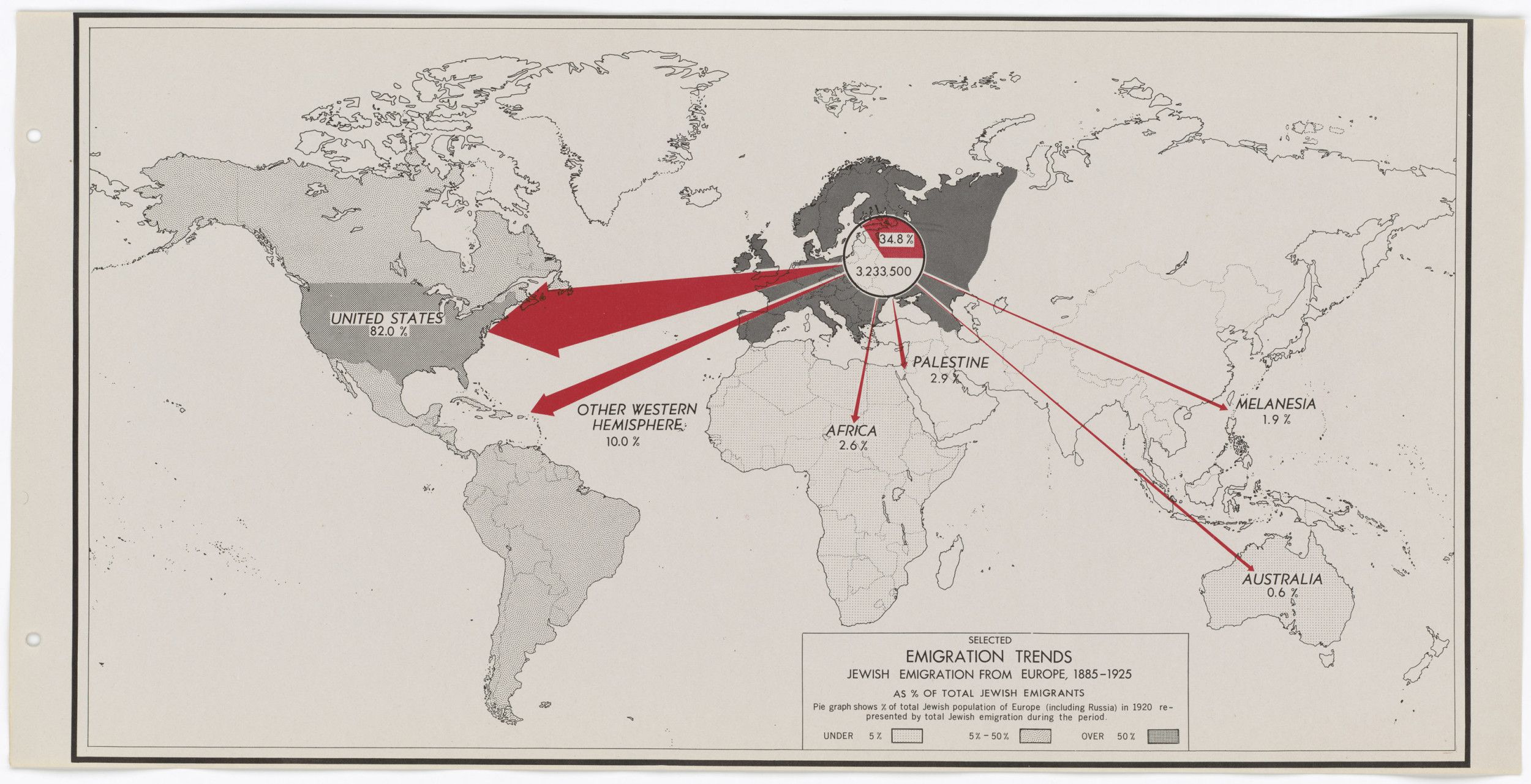
Document
Telegram from W. G. Blalcok to Senator Henry F. Ashurst Regarding Mexican Immigration
5/3/1934
During the Great Depression, the Immigration and Naturalization Service received many complaints—including this 1934 telegram—that Mexican workers were taking jobs from American workers.
This primary source comes from the Records of the Immigration and Naturalization Service.
National Archives Identifier: 7459459
Full Citation: Telegram from W. G. Blalcok to Senator Henry F. Ashurst Regarding Mexican Immigration; 5/3/1934; Sundry File re Importation of Mexican Labor; Subject and Policy Files, 1893 - 1957; Records of the Immigration and Naturalization Service, ; National Archives Building, Washington, DC. [Online Version, https://www.docsteach.org/documents/document/telegram-mexican-immigration, April 25, 2024]Telegram from W. G. Blalcok to Senator Henry F. Ashurst Regarding Mexican Immigration
Page 1

